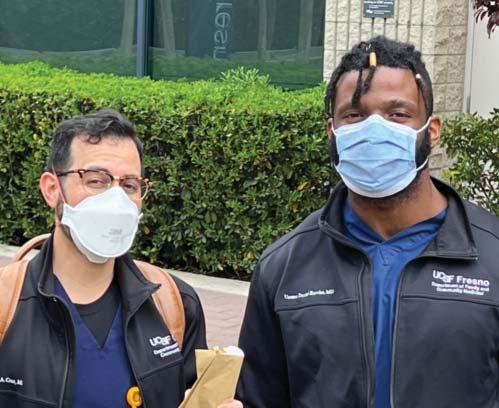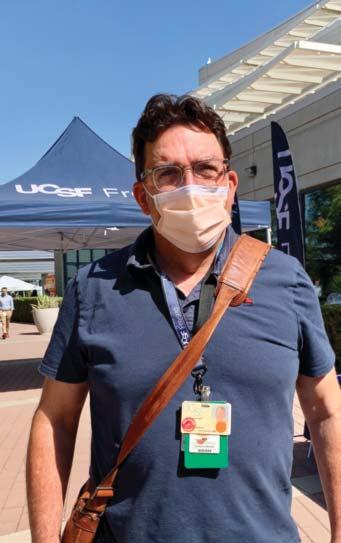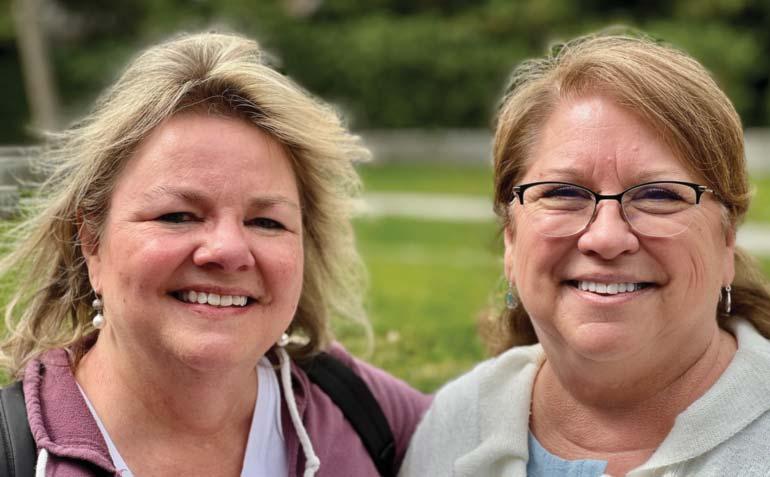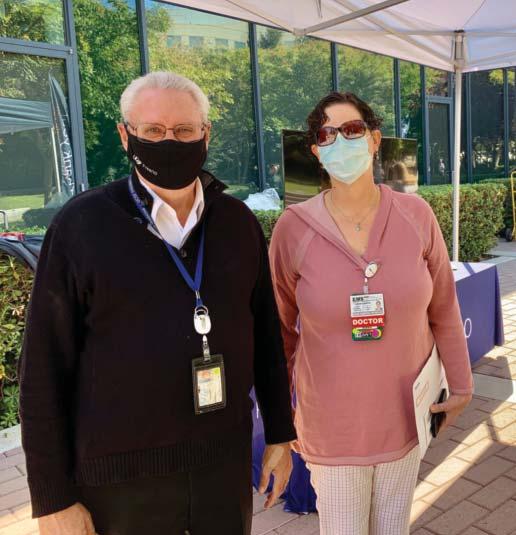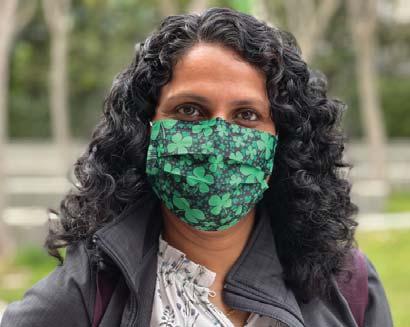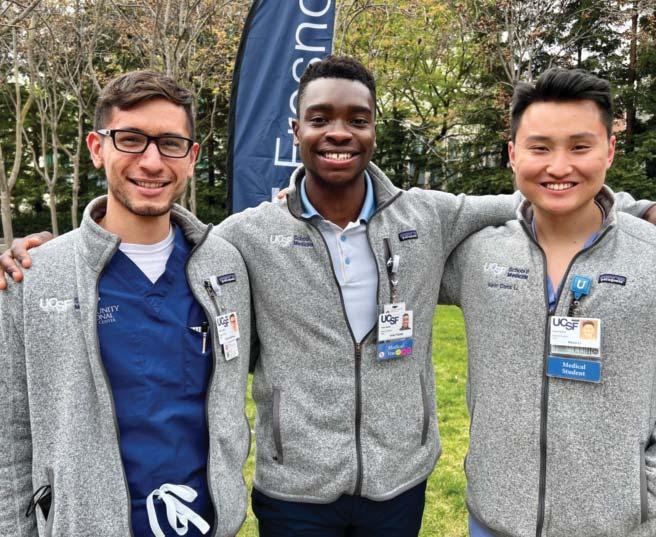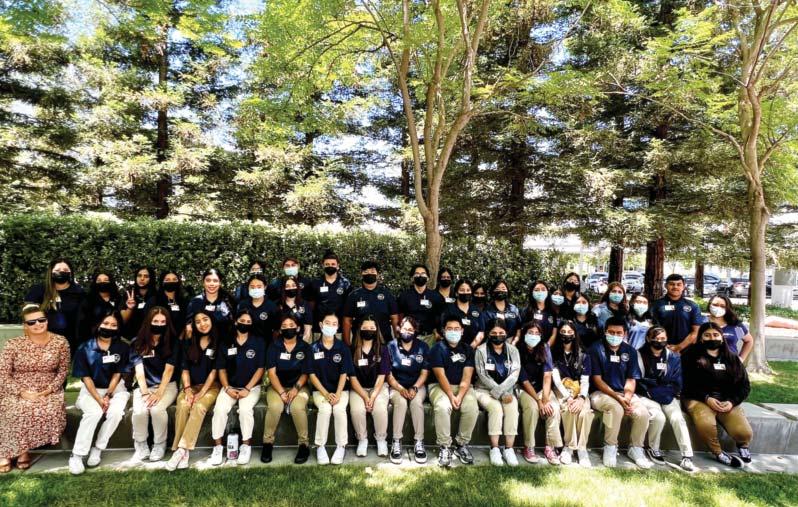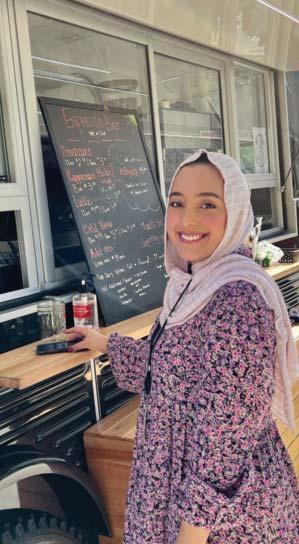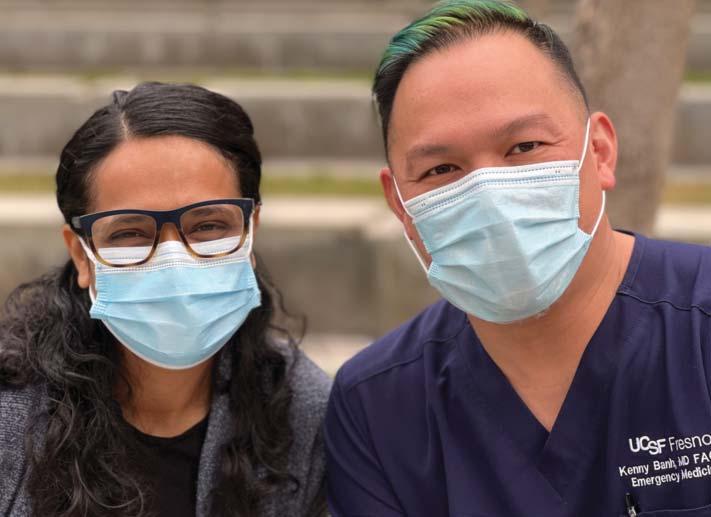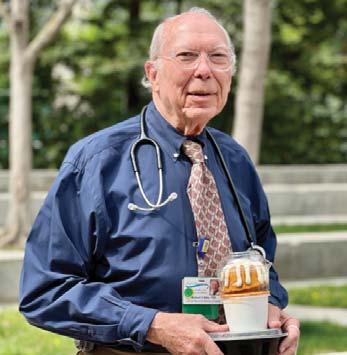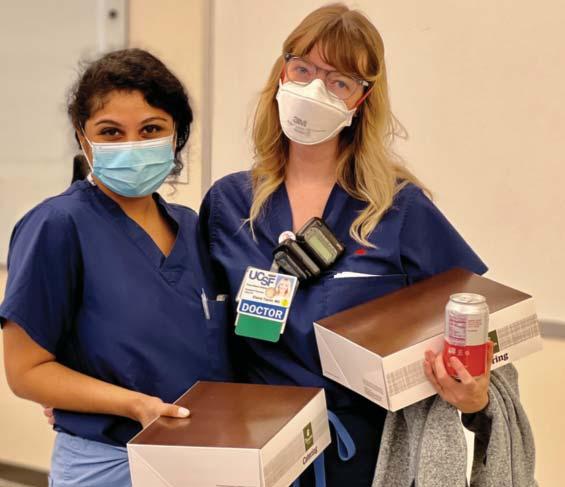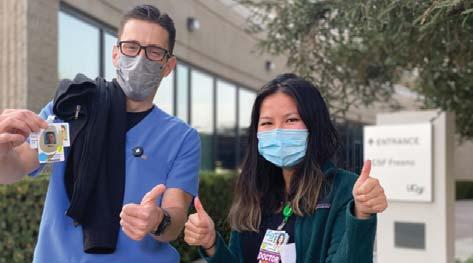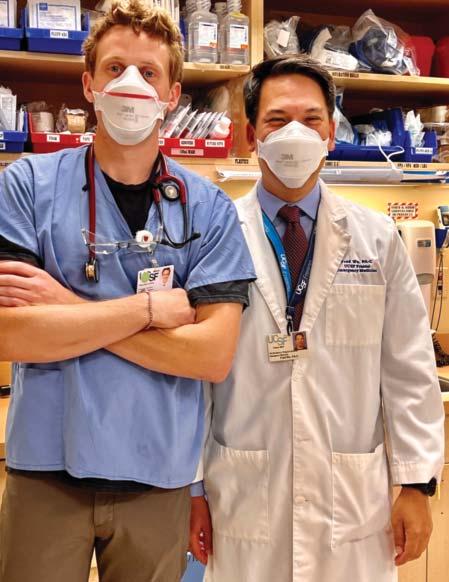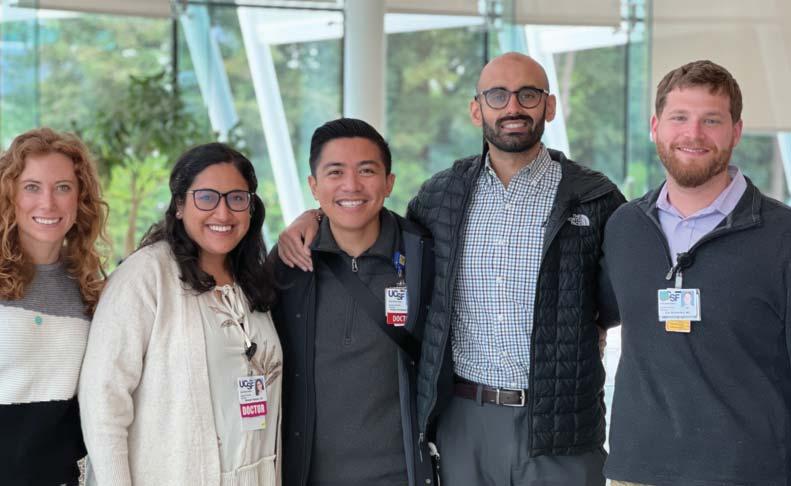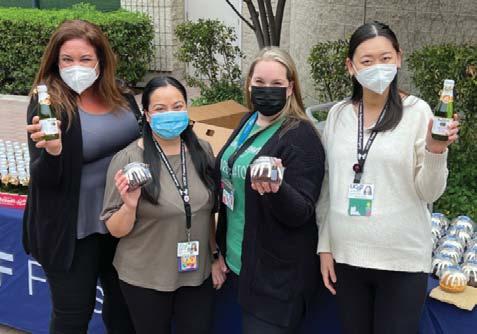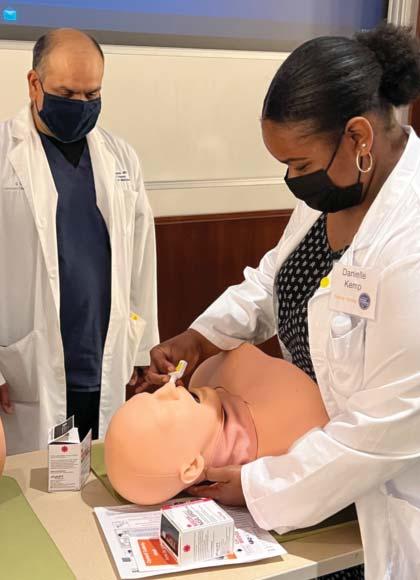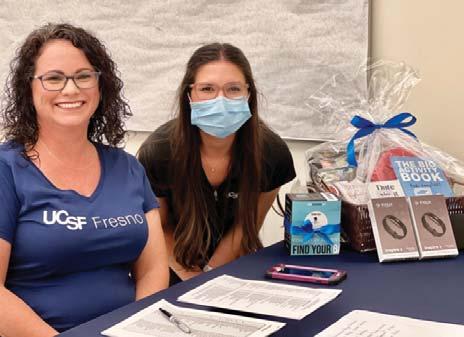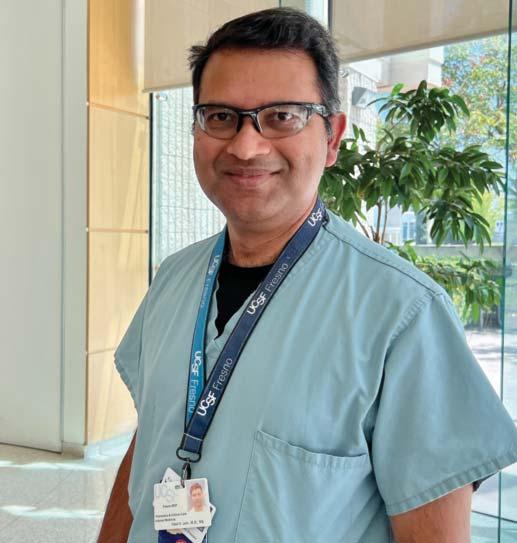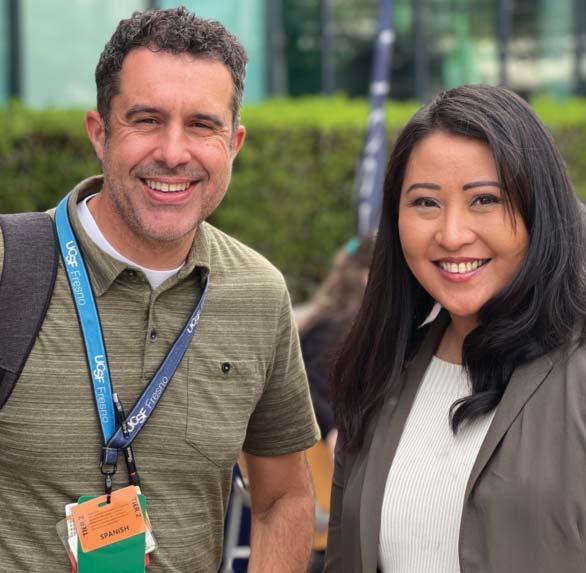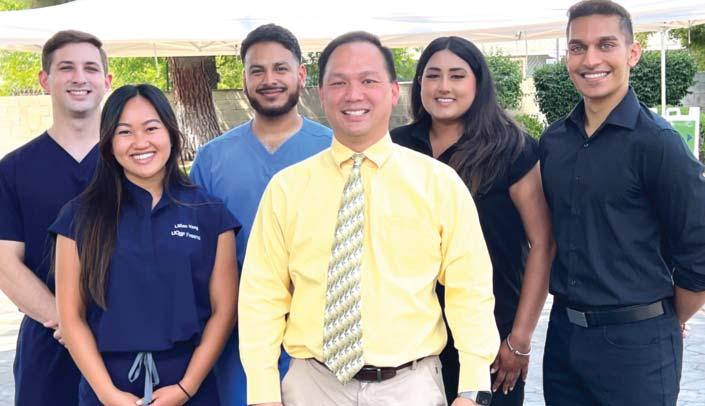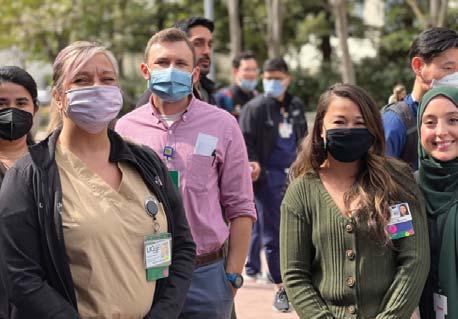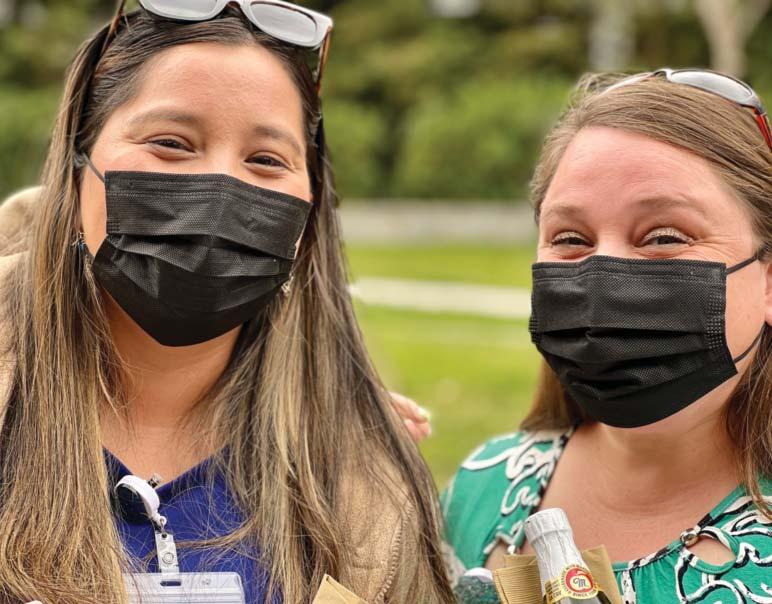




















To address the evolving needs of the growing UCSF School of Medicine regional campus in Fresno, in November 2021, leadership at UCSF Fresno was expanded to allow for specific focus and expertise on two critical areas: 1) expanding undergraduate medical education and overseeing the growing clinical research effort at UCSF Fresno; and 2) overseeing day-to-day operations of graduate medical education and ensuring high quality clinical experiences for resident physicians.
Michael W. Peterson, MD, MACP, oversees inter-campus undergraduate medical education and is responsible for building a network across the San Joaquin Valley to expand clinical training and engaging community providers. In addition, Dr. Peterson has oversight for expanded research initiatives at UCSF Fresno. He was named associate dean in April 2016 and served as interim associate dean since January 2015.
We are dedicated to recruiting, training and retaining the best and the brightest physician leaders and patient advocates in the San Joaquin Valley for the San Joaquin Valley. UCSF Fresno Undergraduate Medical Education is especially interested in future physicians who aspire to provide high quality, diverse and well distributed medical care to improve health in the region. Streamlining the pathway for students to pursue their educational and career goals of becoming physicians and completing the bulk of their medical education and training in the Valley is essential to keeping them in the region.
Over the past year, we widened the pathway to medical school and in doing so, we reinforced our aim to develop a physician workforce in the region that better reflects the demographics of the Valley and improves care and access to care. In partnership with UC Merced, we are launching an eight-year BS to MD program. Known as SJV PRIME+, the program was announced this year and will admit the first 12 students in 2023. We recently kicked off the San Joaquin Valley California Medical Scholars Program in collaboration with Fresno State and many other partners to create a pathway from local community colleges to medical school. In addition, we established an Office of Health Career Pathways to better coordinate and enhance the success of existing pathway programs.
Clinical research is a key component of our curriculum. All faculty and learners are expected to engage in research, especially projects and studies addressing health issues that affect Valley community members. Research is a cornerstone of the UCSF School of Medicine. It drives improvements in diverse and equitable care.
I am pleased to share with you highlights from UME, research and much more in this annual report. As you will read, we extend the UCSF mission to Fresno, the Valley and Central California. We are anchored in the community and contribute greatly to improved health near and far.
We are your UCSF Fresno.
Sincerely,
Michael W. Peterson, MD, MACP


UCSF Fresno Associate Dean for Undergraduate Medical Education and Research Frank and Roxie Moradian Chair in Medicine
UCSF Professor of Medicine
The role of Lori Weichenthal, MD, FACEP, expanded to include clinical affairs and interfacing with clinical partners in addition to oversight of graduate medical education training programs. Dr. Weichenthal continues to serve as Designated Institutional Official at UCSF Fresno and oversees residency programs and the day-to-day operations of clinical aspects associated with the residency programs.
Residency is the opportunity to continue learning the art and science of medicine and to fine tune skills as clinicians. It is challenging, demanding, and exhausting but also exciting and uplifting. The past few years have been unlike any others we have encountered in our lifetimes, and this has increased the challenges of residency and fellowship training. We are traversing through new terrain – from responding to a pandemic to seeking to right health disparities and inequities and advancing social justice.
The goal of Graduate Medical Education at UCSF Fresno is to train skilled, caring physicians who are interested in working with an underserved patient population while addressing health care disparities through meaningful work with the community. We have a holistic approach to training future physicians that includes a strong emphasis on physician wellness and diversity and inclusion. At UCSF Fresno, we work to train physicians for the 21st century who are prepared to be leaders in addressing health inequities that exist in our nation and in our community. We provide them with tools to be advocates for their patients and to be change-agents in our health care delivery system.
As a regional campus of the UCSF School of Medicine, UCSF Fresno conducts training and patient care through a network
of affiliated partners reflecting a variety of training sites with an impressive list of specialists at major hospitals, health agencies and programs, clinics and physicians’ offices and wilderness settings. We are pleased to have signed a multi-year affiliation agreement with Community Health System – our major clinical partner - that extends our decades long partnership and reinforces our commitment to training physicians in the San Joaquin Valley.
We applaud and are thankful for the resiliency and dedication of our trainees, faculty and staff. We appreciate our clinical and community partners and take pride in the positive contributions and impact we have on our patients, our community and our profession.
I am happy to share this annual report with you and hope you enjoy reading about many of our shining moments over the past year. I trust you will be pleased to learn how we are training the next generation and caring for our community.
Sincerely,


UCSF Fresno Associate Dean of Graduate Medical Education and Clinical Affairs, DIO
Associate Program Director, UCSF Fresno Emergency Medicine
UCSF Professor of Clinical Emergency Medicine
Research is integral to UCSF Fresno’s mission to improve health and well-being in Central California. This includes investigating health conditions specific to the region as well as clinical trials that bring new treatments to the area before they are available more broadly.
As assistant dean for research at UCSF Fresno, my focus is on fostering collaboration between all UCSF Fresno teams. This strengthens UCSF Fresno’s ability to conduct relevant research and clinical trials. I also work with our partners in the region to enhance and improve the local research infrastructure.

The UCSF Fresno Clinical Research Center serves as a hub for clinical research in the San Joaquin Valley and is recognized for innovative trials, including several that have contributed to new treatments for COVID-19. Early in the pandemic, UCSF Fresno and CRMC emerged as the region’s leading health care alliance to deal with the challenges of COVID-19.
Meanwhile, the scope of research at the Center continues to expand far beyond COVID-19. Currently, UCSF faculty at the Fresno regional campus are overseeing 50 studies and clinical trials in various stages of progress. Our research activity has probably increased six-fold compared from 2019 to 2022.
We have hired more research coordinators and coordinator assistants to facilitate the increase in research projects being conducted and to increase efficiency and effectiveness.
Finally, we continue to look at ways to increase collaboration with sister institutions such as UC Merced and Fresno State that share our mission in advancing science and health care in Central California.
Kenny Banh, MD, FACEP Assistant Dean for Undergraduate Medical Education (UME)As Assistant Dean for UME, I oversee the training of medical students and other allied health student programs at UCSF Fresno (e.g., physician assistant, nurse practitioner and oral and maxillofacial surgery). The goal at UCSF Fresno is to train students to care for our underserved patient populations while addressing health care disparities in the San Joaquin Valley. Under my leadership, UME has grown from less than 100 students rotating here on an annual basis to almost 400. In 2018, UCSF Fresno was accredited as a regional campus of the UCSF School of Medicine. The designation made UCSF the degree-granting institution for SJV PRIME and paved the way for students to spend most of their medical school training at UCSF Fresno. In 2021, the first students in the new UCSF SJV PRIME began clinical training in the Valley. In partnership with UC Merced, we are starting a four-year BS to MD program known as SJV PRIME+. In addition, we created an Office of Health Career Pathways to better coordinate and increase the success of existing pathway programs. The creation of the new office coincided with the launch of a new lead program, the San Joaquin Valley California Medicine Scholars Program (SJV-CMSP). This pathway program will increase the number and diversity of students coming from regional community colleges pursuing careers in medicine.

As Assistant Dean for Academic Affairs, I oversee faculty promotion and advancement and continuing medical education. UCSF assures the quality of teachers in the academic appointment process. We assess and monitor teaching, clinical care and service. Our role is to oversee who will be teaching our residents and students as well as ensuring that faculty get the recognition they deserve within the university. One of UCSF's roles is also providing continuing education in the Valley. The people who live here deserve the finest clinical care, which requires ongoing training and education. We adapted to the COVID-19 situation in spring 2020 by converting our education from traditional in-person conferences to a virtual format. We continued the virtual format in 2021 and 2022. We are now offering CME and community events in hybrid formats, expanding our reach and programs to even broader audiences. We implement Mini-Med School, which attracts hundreds of students and community members from here and abroad. We strive to remain the foremost provider of continuing education in the Valley. We will continue to develop our CME offerings to meet the needs and demands of local, state, national and global medical communities as well as offer community events aimed at engaging and educating community members about health and medical issues and empowering participants to improve their own health with information and free screenings.
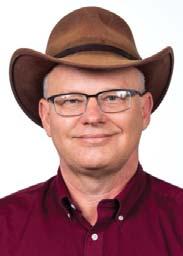
Community Health System
Community Regional Medical Center
Clovis Community Medical Center
Fresno Heart & Surgical Hospital

Community Behavioral Health Center
Community Cancer Institute
Family HealthCare Network Deran Koligian Ambulatory Care Center
Family HealthCare Network – Disease Management Center

Family HealthCare Network-Surgical Services Center
VA Central California Health Care System – Fresno Medical Center
UCSF Benioff Children’s Hospital
UCSF Medical Center
UCSF Medical Center at Mount Zion
UCSF Liver Transplant Program at Parnassus
UCSF Fresno Alzheimer & Memory Center
Community Health Partners (CHP) Gynecologic Oncology Specialists
Community Health Partners (CHP) Medical Oncology Specialists
Community Health Partners (CHP) Pediatric Specialists
Community Health Partners (CHP) Specialty Surgery Associates
University Cardiovascular Center - Clovis University Cardiovascular Center – Fresno University Dermatology Associates

University Diabetes & Endocrine Specialists University Gastroenterology & Hepatology Associates
University Medicine Associates University Obstetrics & Gynecology Center
University Orthopaedic Associates
University Perinatal Associates
University Psychiatry Associates University Pulmonary Associates University Sleep and Pulmonary Associates
University Women’s Specialty Center
Valley Vascular Surgery Associates
Other Affiliated Health Care Institutions and Training Sites
Advanced Laparoscopic Surgical Associates
Anther Pediatric and Adult Sleep Center
Baz Allergy & Asthma Institute
New Sang, MD
Nirmal Brar, MD
California Pacific Medical Center – Mission Bernal Campus
California Poison Control System
Cardiovascular Consultants Heart Center
Central Valley Breast Care Central Valley Regional Center Chestnut Pediatrics
Children’s Health Center Behavioral Clinic
County of Fresno Department of Behavioral Health County of Fresno Department of Public Health County of Fresno Sheriff Coroner’s Office
CPMC Mission Bernal Campus - Sutter Health EPU Children’s Center
Eye-Q Vision Care, Fresno
Fresno Oral Maxillofacial Surgery & Dental Implant Center
Fresno State University Health and Psychological Services
Fresno Surgical Hospital
Fresno Unified School District
Heritage Crossing Inpatient Hospice
Hinds Hospice
Kaiser Permanente Fresno Medical Center
Kaizen Surgery Center
Kaweah Delta Health Care District, Visalia

Neurosurgical Associates Medical Group, Inc.
Optimal Hospice Care
Orthopaedic Associates Medical Clinic, Inc.
Peachwood Medical Group
Raintree Convalescent Hospital
Saint Agnes Medical Center
Sequoia Surgical Pavilion, Visalia
Sierra Pacific Orthopedics & Spine Center
Stanford Health Care - Valley Care
Summit Surgical
The Office of Tushar Patel, MD
Transitions Children’s Services
Turning Point of Central California Rural Mental Health Clinics
Valley Children’s Hospital Valley Health Team, Fresno Valley Surgical Specialists
West Hills Medical Group
Women’s Specialty and Fertility Clinic
Yosemite Medical Clinic at Yosemite National Park
Camarena Health Centers, Madera
United Health Centers of the San Joaquin Valley, Parlier and Mendota Health Centers
Emergency Medicine
Family and Community Medicine

Internal Medicine
Obstetrics/Gynecology
Oral and Maxillofacial Surgery
(School of Dentistry)
Orthopaedic Surgery
Pediatrics Psychiatry Surgery Physician Assistant Residency Programs

Acute Care/Trauma Surgery
Emergency Medicine
Orthopaedic Surgery
Acute Care Surgery
Advanced Cardiovascular Imaging
Cardiovascular Disease
Community Pediatrics
Emergency Medicine Education
Emergency Ultrasound
Gastroenterology
Head and Neck Oncology and Microvascular Reconstruction
Hematology/Oncology
HIV Hospice and Palliative Medicine
Hospital Medicine
Infectious Disease
Interventional Cardiology
Maternal Child Health
Pulmonary Disease/Critical Care
Sleep Medicine
Surgical Critical Care
Wilderness Medicine















The UC San Francisco Office of Diversity and Outreach has continued to work on increasing awareness of implicit biases, microaggressions and discrimination and provide skills for faculty and staff who interact with trainees and learners. The goal is to make a more supportive, equitable and inclusive environment for all.
UCSF Fresno surgeon Andrea Long, MD, and Aimee Abu-Shamsieh, MD, a pediatrician, became the first two Diversity, Equity and Inclusion (DEI) Champion Ambassadors to be trained to coach faculty and staff onsite at the UCSF Fresno regional campus and have been doing so over the past year.
Faculty and staff across all the UCSF schools and campuses have attended workshops led by both physicians.
Residents participated in LGBTQ simulated patient scenarios with mock patients during 2021 intern boot camp. The scenarios were centered either on the care of a trans man in a primary care clinic or of a non-binary patient who had abdominal pain in the emergency room. This exercise allows learners to get feedback and have a wrap up educational session at the end of each scenario.
According to Dr. Long, these types of sessions make a big difference in how medical staff interacts with patients, especially during a COVID- era with a lack of physical patient contact, and help residents jump start getting them back into the clinical environment.
“I think having the ability to practice using words and terms that they may have never said out loud, and may only have read about, and have a simulated actor to give them feedback is incalculable,” said Dr. Long. “It's just absolutely
valuable, and no other way that you can replace it outside of the patient simulation setting.”
Dr. Long and Dr. Abu-Shamsieh have also worked on a modified DEI champion training focusing on the interactive small group skills for residents. This initial was trialed with our pediatric residents and completed with interns during orientation week.
The training includes discussions about microaggressions, being an ally and an upstander while also discussing their role as residents and using it to leverage some of the privileges that they have and help others in the community.
“I think the actual change part is still hard, changing practice, changing culture. Even when there is the willingness and the understanding that we need to, the actual change is an evolving process,” Dr. Long said.
The DEI committee will continue their efforts by setting up more formal mentorship programs with different affinity groups so that based on different social identities, trainees or junior faculty, and staff can reach out to them when they are having problems.
Since there are multiple resources available online and locally, the committee will work with different training programs, and utilize shared curriculum resources. In November they will host a second annual health equity conference, At Risk in the Central Valley: Voices from the Black and Hmong Communities.
The conference is the second installment of the UCSF Fresno Health Equity Symposium series and will focus on two at-risk groups: Black Women and the Hmong Community.
“The CDC identifies the recognition of personal and corporate unconscious bias in health care as a key way to help improve physician outcomes. The purpose of this conference is to do just that by listening to expert community voices and their stories,” Dr. Long said.
Attendees will learn how to define medical racism and identify risks of implicit bias through real-life examples of the Black birthing community, gain a better understanding of the background and services introduced under SB 65, become familiar with the hoped significance of doula benefits covered under Medi-Cal, interpret respectful care, culturally congruent, and power-sharing opportunities in maternal and infant care, and better understand how to navigate the complex relationship between the Hmong community and Western health care.
“This year we are focusing on black maternal mortality because it is at an astronomically high rate compared to other social identity groups and we are figuring out ways that we can start to improve mortality in Fresno. We also wanted to talk about health care disparities in the Hmong community because they're not well known or studied,” Dr. Long said.
An internal Wiki page, an interactive, collaborative space for sharing events and educational resources with UCSF members will also be available. It will be a place to share faculty presentations and elicit feedback as well as collaborate on curriculum topics for our trainees.
Andrea Long, MD

On June 9, 2022, UCSF Fresno celebrated commencement in person for the first time since 2019. In-person gatherings were not held to prevent further spread of COVID-19. Ninety-five medical residents and fellows, four oral and maxillofacial surgery dental residents and one head and neck oncology and microvascular reconstruction fellow, along with eight physician assistants in three different programs are completed training this year. The total number of graduates from UCSF Fresno training programs was 108. Many of the graduates are staying in Fresno and the Central Valley to care for patients, teach future physicians or continue their medical education.

“We are delighted to gather and celebrate in person this year after two years of virtual ceremonies,” said Lori Weichenthal, MD, Associate Dean for Graduate Medical Education and Clinical Affairs and the Designated Institutional Official at UCSF Fresno. “I want to thank everyone who helped make this event possible and to assure that we celebrate in an environment that aims to keep us healthy and safe.”
Residency is the required hands-on clinical training (postgraduate training) when clinicians fine-tune skills under the guidance of attending faculty members prior to practicing independently. Resiliency, dedication, determination and commitment to service are common among UCSF Fresno learners and this year’s class demonstrated those traits throughout their training during the most challenging of times.
“The past few years have been unlike any others we have encountered in our lifetimes, and this has increased the challenges of residency and fellowship training. We are traversing through new terrain – from responding to a pandemic to seeking to right health disparities and inequities and advancing social justice,” Dr. Weichenthal said. “We applaud and are thankful for resiliency and dedication of our learners. We also applaud the strength and determination of their colleagues and our faculty and staff.”
Associate Dean for Undergraduate Medical Education and Research Michael W. Peterson, MD, joined Dr. Weichenthal in congratulating the graduates and acknowledged their contributions to medical student education and for contributing to the learning environment at UCSF Fresno.
“We are grateful for the knowledge you have shared with those who follow in your footsteps and trust that the opportunities to teach have enhanced and enriched your training," said Dr. Peterson. “Just as you have left your mark here, we hope that you remember the knowledge and skills you acquired at UCSF Fresno and the lessons learned from the patients we care for. Congratulations on your achievements UCSF Fresno Class of 2022. Go with confidence and compassion to serve and improve our communities, the health of your patients and of our profession.”
As the winner of the 2021 Henry J. Kaiser Award for Excellence in Teaching, the commencement keynote speaker was Mohammed Sani Bukari, MD. Dr. Bukari is a faculty member in the Department of Internal Medicine, Division of Hematology and Oncology and director of the Sickle Cell Program at UCSF Fresno.
Graduates from Community Medical Centers’ General Dentistry Residency program also were recognized during the commencement program.
UCSF Fresno 2022
• 50% of residents completing training in the Department of Emergency Medicine are staying in the Central Valley to provide care
• Nearly 40% of residents completing training in the Department of Family and Community Medicine are staying in the region to provide much needed primary care
• 60% of Internal Medicine residents are staying in the Central Valley
•Both fellows in the Gastroenterology and Hepatology Fellowship Program are staying in the Central Valley
• 40% of residents completing training in the Department of Pediatrics are staying in the region
• 3 out of 5 graduating residents in the Department of Psychiatry are staying in the Cental Valley. According to a California Health Care Foundation Report, there are 6.5 psychiatrists per 100,000 population in the San Joaquin Valley. The state ratio is 11.8 per 100,000 people.
Jessica Wang, DO
UCSF Fresno Family and Community Medicine, “Outstanding First-Year Resident,”

Julian Nguyen, DO
UCSF Fresno Family and Community Medicine, “Outstanding Resident or Fellow Teacher”
Kulraj Dhah, DO
UCSF Fresno Family and Community Medicine, “Outstanding Attending Teacher”
Julianne Jacober, CNMCommunity Regional Medical Center, “Outstanding Non-Physician Teacher”
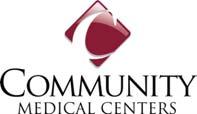
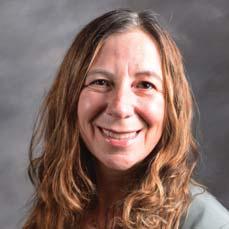
Marina Roytman, MD
UCSF Fresno Department of Internal Medicine, “Borba Faculty Research Award”
Andrew Hwang, MD
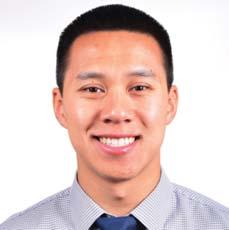
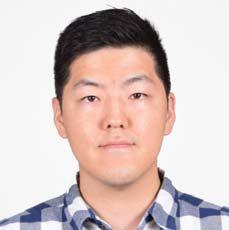

UCSF Fresno Hematology/Oncology Fellowship, “Borba House Staff Research – Fellow Award”
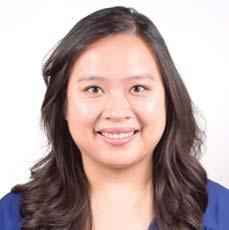
Omar Mahmood, MD
UCSF Fresno Department of Internal Medicine, “Borba House Staff Research –Resident Award” “VA ICare Award”
Rachna Casteel, DDS, OMFS, “Leon S. Peters Resident of the Year Award”
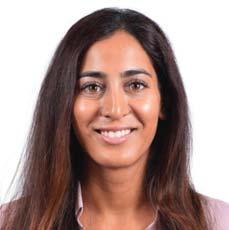
James Yang, MD
UCSF Fresno Pulmonary and Critical Care Fellowship, “Leon S. Peters Fellow of the Year Award”
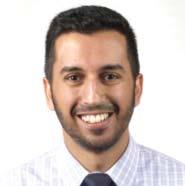


Brian Chinnock, MD, RDMS
UCSF Fresno Department of Emergency Medicine, “Kaiser Award for Excellence in Teaching”
Heather Chow, DO
UCSF Fresno Department of Pediatrics, “Steven N. Parks Leadership Award”
Nicholas Betchel, DO, completed a four-year residency training program in Psychiatry at UCSF Fresno. He stayed at UCSF Fresno as a Psychiatry faculty member and as a member of the Consultation Liaison Psychiatry Service at Community Regional Medical Center.
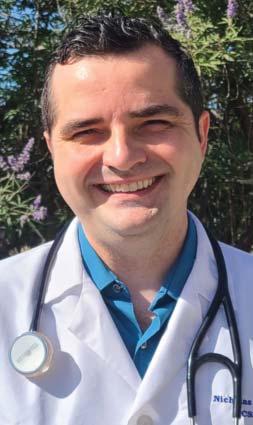
Dr. Betchel was inspired to become a physician by his father, an emergency medicine doctor. His father’s death during his senior year in high school was a significant setback, but Dr. Betchel credits support from spouse, Kaitlen, for getting him back on the path to medicine.
Originally, Psychiatry was not on his radar in medical school. However, his first day of clinical rotation in the specialty cemented a decision he is incredibly grateful to have made. “Being a physician encompasses all that I wanted from a career. It is challenging, interesting and serves as an opportunity to positively impact the lives of others,” he said.
Dr. Betchel grew up in Merced and graduated from Golden Valley High School. He completed his undergraduate education at Fresno Pacific University and earned a medical degree from Midwestern University in Glendale, Arizona.
Charney Burk, MD, completed a four-year residency training program in Emergency Medicine at UCSF Fresno. Dr. Burk, originally from southern California, has joined the UCSF Fresno Department of Emergency Medicine as faculty.
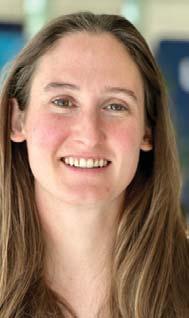
“I am fortunate to be able to stay here as faculty,” said Dr. Burk. “I love this family. I want to continue to work with this amazing team and want to maintain this amazing environment for future learners.”
Raised in Tustin, California, Dr. Burk attended the University of Portland as an athlete then transferred to and graduated from UCLA. She spent 20 years toward a soccer career, but an injury at UCLA and a difficult experience at University of Portland led to her “hanging up her cleats.” She earned her medical degree from the Keck School of Medicine of USC. She was inspired to become a physician by her brother who attended medical school while she was at the University of Portland.
Originally, Dr. Burk thought she would be a pediatrician because she loves children or a psychiatrist to help those struggling with mental illness, but multiple mentors pointed her to Emergency Medicine. The Emergency Medicine team environment and pace and variety of patients solidified her career choice.
Marlon Echaverry, MD, completed a three-year residency training program in Family and Community Medicine at UCSF Fresno. Dr. Echaverry joined the UCSF Fresno Department of Family and Community Medicine as faculty.

Born in Nicaragua, Dr. Echaverry immigrated to the United States with his family when he was four years old. He grew up in Miami, Florida, attended Hialeah-Miami Lakes High School and graduated from Florida International University with a bachelor’s in Biology. He earned a medical degree from Ross School of Medicine and completed his clinical years in Bakersfield.
He was inspired to become a physician by his father, who was a pediatrician in a small town in Nicaragua. A love of science and using his knowledge and skills to serve underprivileged minorities also motivated him. Obtaining U.S. citizenship and getting admitted to and completing medical school were challenging but a belief in hard work, working smarter and robust support helped him succeed.
“I would not be where I am if it were not for my family and my wife Dr. Rebecca Waters. We met in medical school, and she has been my rock through every obstacle,” said Dr. Echaverry. Dr. Waters completed training in Family and Community Medicine at UCSF Fresno in 2020.
A first-generation Indian American, Neetu Malhi, MD, completed a three-year residency training program in Internal Medicine at UCSF Fresno. Dr. Malhi is working as a neurohospitalist at Community Regional Medical Center.
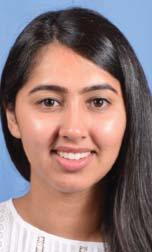
Dr. Malhi was born and raised in Fresno. She went to Central High East Campus and graduated from Fresno State. She earned her medical degree from the UC Davis School of Medicine as part of the San Joaquin Valley Program in Medical Education (SJV PRIME).
She developed an interest in medicine early after her family lost a loved one to pancreatic cancer and another loved one was diagnosed with a brain tumor. The kindness offered to her family by the medical team at that time inspired Dr. Malhi to give back, especially when she contrasted her family’s experiences with those who had inequitable access to care locally and across the globe. The community immersion she experienced as part of the SJV PRIME underscored the need for a culturally competent, diverse pool of physicians in the Valley.
Reflecting on her training, Internal Medicine sub-specialty exposure, Dr. Malhi said the support of family, friends, and mentors made obstacles seem insignificant. “My grandmother especially has an unwavering faith in me and is one of my greatest inspirations. Whatever achievements in life are thanks to the sacrifices of my parents and grandmother.”
Nicole Takeda, MD, completed a five-year General Surgery residency at UCSF Fresno. She is now completing a fellowship in Minimally Invasive and Bariatric Surgery with Advanced Laparoscopic Surgery Associates Medical Group in Fresno.
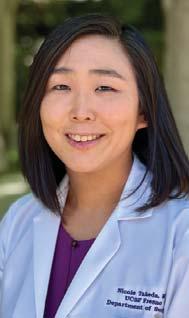
Born and raised in Fresno, she attended Valley Oak Elementary School, Kastner Intermediate School and Clovis West High School. She obtained a bachelor’s in Human Biology from UC San Diego and earned a medical degree from the UC Davis School of Medicine. Dr. Takeda worked in pharmaceutical research before medical school. A volunteer job at a mobile health clinic steered her toward medicine.
The unexpected death of her father during her fourth year in medical school taught her life-changing lessons that resonate in her work. “It is important to consider the role we play as physicians,” she said. “Our words and actions matter. It takes little energy to be kind, and to the recipient, it may mean the world. We also must make our time count because sometimes there is no later.”
While patient advocacy drew her to medicine, she chose surgery for the hands-on patient care that combines a quest for knowledge with a way to serve and alleviate suffering.
Reflecting on training at UCSF Fresno, she said, “the faculty, staff, residents, students, and patients make this program unique. It is a culture that provides support and flexibility which are vital in a busy work environment. Serving the Valley is an opportunity to care for those in need and to learn from unique pathologies and disease processes.”
Cristina Vega, PA-C, ATC-L, MMSc, MHA/Ed, completed a 12-month postgraduate physician assistant (PA) residency training program in Orthopaedic Surgery at UCSF Fresno. She is currently employed by Central California Faculty Medical Group and is working in a clinical setting at University Orthopaedic Associates in Clovis.
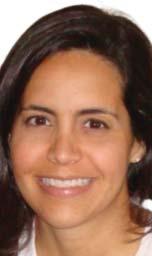
Raised in Snellville, Georgia, a suburb outside of Atlanta, she attended Brookwood High School, the University of Georgia and graduated from Emory University School of Medicine’s Physician Assistant Program. Prior to PA school, she worked in sports medicine with orthopaedic physicians. A mentor who had followed the same path encouraged her to become a PA.
“I never thought I would get into PA school because I have a learning disability and I am not a strong test taker,” she said. School was demanding but a strong support system and accommodations approved for testing and tutors helped greatly. “The fact that I was able to become a PA regardless of my learning disabilities is a point of pride,” said Vega.
She was drawn to orthopaedics because of her prior experience. “I loved working directly with the attendings and residents. I am much more confident in my ability having completed the UCSF Fresno Orthopaedic PA Residency Program.”
PA Vega decided to stay in Fresno because of the family atmosphere in ortho and the Fresno/Clovis area reminds her of where she grew up.
The UCSF School of Medicine’s San Joaquin Valley Program in Medical Education (SJV PRIME) seeks to recruit and train future physicians to address the unique health needs of the region’s diverse and underserved populations. Students admitted to the program currently spend their first 18 months of medical school in San Francisco, then transition to the Fresno regional campus for the remainder of their education. SJV PRIME incorporates the unique expertise of UCSF, UC Merced, and UCSF faculty at UCSF Fresno, as researchers, educators and leaders in the field of health care in the Valley with a curriculum tailored to address health issues prevalent in the Valley.
All SJV PRIME medical students come from or possess close ties to the Valley and are particularly motivated to ensure that high-quality, comprehensive, and well-distributed medical care is available to improve the health of populations, communities and individuals in the San Joaquin Valley. SJV PRIME helps us “grow our own” by training students from the Valley, in the Valley, and for the Valley.
We want our graduates to have the financial freedom to pursue their passions, yet most students who aspire to become physicians through SJV PRIME lack the financial means to do so. Student scholarships are crucial to ensuring that the brightest, most diverse, and most public serviceminded students can attend UCSF and graduate from SJV PRIME with minimal debt. Establishing a new scholarship or

giving to one that already exists makes a difference in the life of a talented, purpose driven student who shares UCSF Fresno’s mission and culture of innovation, service, compassion, and collaboration.
Grateful for their own careers in health care, Carl and Lulu Mitchell made a generous gift to the SJV PRIME Scholarship Fund through the Carl and Lulu Mitchell Family Foundation, which focuses on supporting health care and education initiatives. Carl and Lulu have a heartfelt commitment to help our students - many of whom come from communities that have been historically excluded from medicine - afford the world-class medical education UCSF offers.
A generous gift from the American Ex-Prisoners of War Fresno Chapter #1 established the Ron Naggar, MD, Scholarship Fund for SJV PRIME students who are active military or military veterans. Commander Vernon Schmidt and the members of the Ex-POWs created this scholarship as a lasting tribute to the late Dr. Naggar - a UCSF faculty member for over 30 years – for his lifetime of healing and compassionate care of local ex-POWs and their families. We are grateful to these community members and their support that helps ensure that the highest-quality medical education remains accessible to the most exceptional Valley students who mirror the diversity of the communities they will one day serve. To learn more about how your gift to UCSF Fresno can help us continue the important work of educating the next generation of physicians for the Valley, contact Kathleen Smith, assistant director of development at kathleen.smith@ucsf.edu or (559) 499-6426.


New residents or interns start their training at UCSF Fresno with a weeklong orientation and clinical skills boot camp. Due to the pandemic, this year was the first time since 2019 the traditional in-person format was back. The Graduate Medical Education Department onboarded interns the week of June 21, 2022. Interns were fit tested for masks and practiced donning and doffing along with various clinical skills activities. In addition, all new residents gathered for workshops led by UCSF Fresno and Community Regional Medical Center leadership.




Media often turn to faculty physicians and residents at UCSF Fresno for their expertise on health and medical issues. Over the past year, UCSF Fresno experts have been interviewed by local, state, national and international outlets on topics ranging from the air pollution/air quality, bivalent COVID-19 boosters, child vaccines, COVID-19 testing, COVID-19 vaccines, doctor shortage, fentanyl, flu, health disparities in vascular disease, heat, Hidradentitis Suppurativa, Monkeypox (MPX), mask mandates, monoclonal antibody treatment, Pre-Surgical Internship Program, San Joaquin Valley California Medicine Scholars, Sickle Cell Awareness Month, standardized patients, status of COVID-19 in the Valley, training physicians in the Valley for the Valley, vaccine hesitancy by race among other topics.
Between July 1, 2021, and June 30, 2022, UCSF Fresno was mentioned 1,174 times in print, broadcast and online media outlets, reaching an estimated audience of 743,062,026 resulting in a publicity value of $55,812,631.




The migraine headaches began during an abusive marriage 16 years ago. The pain kept Christine bedridden for a week at a time and a doctor prescribed Vicodin – three pills a day. The headaches subsided, the stressful marriage ended, and she no longer needed the opioid pills for pain relief.
But Christine continued taking the pills and eventually three a day were not enough. She had developed an opioid use disorder.
“It gets out of hand and you don’t even realize it’s getting there,” says Christine, 50, of Fresno, who asked to be identified by only her first name because she does not want her employer to know of her drug use history.
Over the years, Christine tried to stop taking opioids, mostly at times when she could not fill a prescription or buy drugs off the street. Withdrawals – even the thought of having body aches, sweats, chills, runny nose, watery eyes, throbbing headache – drove her to take more pills. She went to an addiction clinic for help and quit for about a year but relapsed. While living with a friend out of state in 2020, she never took a pill but when she returned to Fresno and to familiar stresses, the drug use resumed. “A lot of it has to do with family,” she says. I’d try anything to escape that reality.”
This spring, Christine reached a breaking point and knew she had to get help. “I couldn’t take it here anymore. And so many times I had just thought about blowing my brains out, but I always pictured my kids at my funeral and that always stopped me. So, I knew I would never do that.”
She went to an addiction clinic, but it was on a Friday afternoon at closing time, and she was sent to Community Regional Medical Center (CRMC), where UCSF Fresno emergency physicians have a BRIDGE program to help opioid use disorder patients who are in crisis. Patients also can receive ongoing, follow up care at a new Medication Assisted Treatment (MAT) clinic established by the UCSF Fresno Department of Family and Community Medicine at United Health Centers of the San Joaquin Valley (UHC) in Parlier. BRIDGE and MAT are among UCSF Fresno efforts to increase access to care and improve treatment for patients with opioid use disorder.
Opioid use disorder is at epidemic levels across the country and overdose deaths are increasing. According to recently released data from the federal Centers for Disease Control and Prevention, more than 93,000 people in the U.S. died last year of a drug overdose, an increase of nearly 30% from 2019.
Substance use disorder, and in particular opioid use disorder, has increased in Fresno County during the pandemic, says John Zweifler, MD, a volunteer clinical professor at UCSF Fresno who supervises residents in the Family Health Care Network primary care clinic in downtown Fresno. According to the Fresno County Department of Public Health, 33 people died from the opioid Fentanyl in 2020, compared to 15 fatal overdoses reported in 2019 and only two in 2018. All opioids (including Fentanyl) led to 48 deaths in the county in 2019. Dr. Zweifler, a medical consultant for the Fresno County Department of Public Health, is working with UCSF Fresno Family and Community Medicine physicians to design a MAT pilot project for providing care to homeless individuals. “UCSF Fresno has a number of strong advocates for Medication Assisted Treatment,” he says.
Patients with substance use disorder or who are taking chronic opioids or benzodiazepines who need to see a physician for getting weaned off these drugs can be referred to the UHC clinic through the CRMC emergency department or through any physician within the United Health Centers of San Joaquin Valley clinic system. They also can request an appointment through the front desk at UHC Parlier as a new patient and will be accommodated, sometimes on the say day based on the need. Insurance is helpful but not mandatory for the visit and patients can be seen on a nominal sliding fee through UHC clinics, he says.
“Access to treatment has to be easier than access to street drugs and until that happens, we’re going to have an opioid epidemic,” says Rais Vohra, a UCSF Fresno emergency physician, director of local poison control and interim Fresno County Public Health officer. Dr. Vohra helped establish BRIDGE at CRMC, which provides a link between emergency care and substance use disorder recovery programs. Patients are given buprenorphine, a partial opioid agonist that works to decrease withdrawal symptoms and reduce physical dependence on opioids. The program, funded by federal and state grants, also has trained substance use navigators at CRMC who provide patients with referrals for ongoing MAT and links to other services.
“We are ready to serve patients 24/7 through the emergency department and see that there is follow up with a primary care doctor,” Vohra says.
Christine received a two-week supply of Suboxone (a combination of buprenorphine and the overdose-reversing
drug naloxone). She was given a referral for an appointment with Muhammad Shoaib Khan, MD, a UCSF Fresno Family and Community Medicine physician and addiction specialist who started the Medication Assisted Treatment clinic at UHC.
The prescription for Suboxone was a lifesaver, Christine says. The minute she put it under her tongue, she immediately felt like a “normal” person. “There’s no high to it. There’s none of that. You just feel normal.” And Christine, says, “that normal feeling is the best feeling in the world.”
But staying “normal” is a struggle. “When you feel normal, you also have to deal with reality. That comes along with it,” Christine says. Her twice monthly appointments with Dr. Khan and the appointments with a behavioral therapist that Dr. Khan arranged for her are essential to her recovery.
“Dr. Khan is very understanding,” Christine says. “He listens. He just sits there and watches you while you’re talking. So, you know he’s listening. He’s never rushed. Whatever time you need. He’s listening. He hears you.”
A lot of his MAT clinic patients have diseases that are stress related, Dr. Khan says. “Unless you take a multi-specialty, multi-modal approach to treating addiction, it is not completely resolved by taking a medicine. It is a psychiatric illness that needs to be addressed at the root cause. A lot of these folks who have substance use disorder are not taking the medicine to just feel a certain way, they are taking it because they have issues in their lives that they have not addressed and it’s a distraction. It is to cope with their problems.”
But there are various reasons for the overuse of opioids and for becoming dependent on them, Dr. Khan says. Some patients have ongoing physical pain that has not been addressed surgically or in other ways. Other patients have become chronically dependent on painkillers that were prescribed by physicians following a surgery or another medical condition. “We know now in addiction medicine that these folks don’t have the motivation to get off these drugs. So, you have to walk with them while they are on this journey of getting off these drugs. They are so dangerous that pain actually can increase while they are taking them. So, it’s a constant cycle where they take them for a long time, they feel more pain, they increase the dose, and it moves closer and closer to death.”
It is not a moral failing to have an opioid use disorder, says Liana Milanes, MD, associate program director and chair of the Behavioral Science Curriculum at the UCSF Fresno Department of Family and Community Medicine. “It’s easy to fall into judgment when it comes to addiction,” she says. “They need medicine just like the person with diabetes needs medicine. There is nothing this person has done really wrong. They have fallen into this chronic disease and now it’s something they have to deal with for life. The science behind addiction is that it is a chronic brain disease that is prone to relapse.”
Training physicians to be able to provide MAT is a priority of Drs. Milanes and Khan. This summer, they organized a Continuing Medical Education webinar for primary care physicians in the central San Joaquin Valley to teach MAT basics so physicians will not be hesitant of prescribing buprenorphine for treating opioid use disorder, be able to prescribe it appropriately; and also to have conversations with patients to decide if it’s an opioid use disorder, Dr. Milanes says.
In 2019-20, Dr. Milanes led an effort to get residents and faculty in the Department of Family and Community Medicine trained in MAT, and she is one of 25 physicians nationwide who are working with the Society of Teachers of Family Medicine (STFM) to create a pilot MAT curriculum. “Hopefully, by the end of the year we have a standardized curriculum that we can send out,” she says.
Second- and third-year residents in Family and Community Medicine have opportunities to engage with MAT patients by shadowing Dr. Khan at the rural clinic in Parlier, and they also can see patients in downtown Fresno who are being treated at the primary care clinic at Family Health Care Network.
The blend of rural and urban training experiences is unique, Dr. Khan says. “This problem is even worse in the rural areas and the training is even less available for those areas.”Providing addiction medicine in an underserved area is what attracted Dr. Khan to open the MAT clinic in Parlier this past August.
After medical school, medical research and residency, Dr. Khan pursued further training in Global Health with the Health Equity, Action and Leadership (HEAL) Initiative with UC San Francisco. As part of his HEAL fellowship, he provided care on the Navajo Nation and in West Africa. “That was probably one of the most life-changing times in my life,” he says.
“It really solidified what I wanted to do as my career, which is underserved care.”
Marlon Echaverry, MD, a third-year resident, has shadowed Dr. Khan. He has an interest in addiction medicine that he says comes from his father’s success in overcoming alcohol misuse when Dr. Echaverry was a teenager. “I know people can change.” He envisions a day when substance use is looked at as any chronic medical condition. “I hope for the day when it doesn’t have to be a specialty clinic and that every physician is trained in it,” he says. “I wish every (residency) program in the U.S. was doing MAT training and addiction medicine for their residents because then you would have an entire army of physicians trained in these therapies.”
Sireesha Mudunuri, DO, a third-year resident, is grateful for the opportunity to work with Dr. Khan at the MAT clinic at UHC in Parlier. “To actually see it in practice is very helpful,” she said. She expects the training will be put to good use after residency. “In talking to a lot of graduates, they have gone on to use it in their practices.”
MAT training is essential for the future physician workforce, but Dr. Khan can use help now. At the half-day MAT clinic in Parlier, he typically can see 10 to 15 patients. Most need to be seen every two to four weeks until they are stable, and each visit can take a long time. “If I have more than three or four new patients in a half-day, it becomes really difficult to complete all the work in a timely way,” he says.
“I feel grateful to be a part of this, but also I know I cannot do this on my own,” Dr. Khan says. “So, when a resident is with me, it’s not only good learning for them it’s also helpful to me because sometimes they can help do additional history taking for the patients or follow ups with me that supports my work.”
Christine says everyone could benefit from primary care doctors being trained in MAT. She has transferred her primary care to Dr. Khan. “He got me set up for a mammogram, Pap. He got me set up for absolutely everything.”
Many of the patients with substance use disorder seen at the BRIDGE program at CRMC are patients in need of primary care physicians to oversee their care, Dr. Milanes says. “They need patient-centered care and chronic disease management.” UCSF Fresno’s goal is to provide those physicians through the training of residents in MAT and by augmenting substance use disorder and addiction medicine education for providers in the community, she says. “We want everyone to be on the same page as seeing this as a chronic disease and have an understanding of substance use disorder management strategies.”
Cathy Holen woke up on a recent morning and her right thumb clicked and popped every time she tried to bend it. Holen types every day at her job at the U.S. Department of Agriculture in helping farmers apply for federal crop insurance, and suddenly she had limited use of her thumb.
“I had no grasp. I couldn’t grab things. I had no strength in it. And it hurt. It hurt really bad. And over time, it kept getting worse,” she said. “It wasn’t just clicking and popping any more, it was locking.”
Holen was diagnosed with stenosing tenosynovitis or “trigger finger,” a relatively common and painful condition in which a finger or thumb freezes in a bent position. Holen sought care from Nathan A. Hoekzema, MD, a UCSF Fresno orthopaedic surgeon who specializes in surgery of the hand, wrist and elbow. Dr. Hoekzema had treated her three years prior for a joint issue with another finger.
Steroid injections often resolve a trigger finger, but in some patients, surgery is necessary. In Holen’s case, her symptoms did not disappear after a steroid shot and she prepared herself for surgery and all it would involve, including a hospital admission. To her surprise, Dr. Hoekzema gave her a choice of having the surgery in a hospital – or at the University Orthopaedic Associates office in Clovis.
“He said, ‘you can either come in the office and just have it numbed and be awake for it (the surgery) or you can go to the hospital and they can sedate you.’ And I chose to come here and not be sedated. It doesn’t make any sense. You always feel awful afterwards and I just didn’t want to do that,” Holen said.
University Orthopaedic Associates has been offering in-office surgery for trigger finger for about four months. It requires a procedure area, but Dr. Hoekzema said the surgery itself is something that can easily be done in an office. It involves making a small incision to release the bulge or knot that the tendon is catching on. It does not require a lot of cutting or equipment, he said. Patients are given a local anesthesia, called WALANT, to numb the hand area. The anesthesia makes office-based procedures easier because it minimizes bleeding and maximizes visualization of the surgery site.
In-office surgery is efficient, Dr. Hoekzema said. It takes about 30 minutes from check-in at the front desk to walking out, he said. By contrast, having surgery for trigger finger in a hospital can take three hours, including time for blood tests, insertion of an intravenous line for anesthesia, visits with nurses and an anesthesiologist, and time for recovery. Surgery in an office also is less costly than a hospital procedure, which makes it an attractive option for patients who are uninsured, under-insured, using a Health Care Savings Account or who have high insurance deductibles.
While having surgery in the office is all-around more efficient than going to the hospital, Dr. Hoekzema reminds patients that “it’s not like you’re cutting corners or getting out easy from an operation. You still have to heal. You still have to go through all the healing milestones. But the procedure itself is a bit easier. And you avoid some of the things that anesthesia needs, like labs, chest X-rays and EKG (electrocardiogram). We don’t need those in the office because it’s straight, local anesthesia.”
But in-office surgery is offered only as an option for patients with trigger finger, Dr. Hoekzema said. “It’s never mandatory.” He understands some patients prefer surgery to be done in the hospital.
Besides offering in-office surgery for trigger finger, Dr. Hoekzema also provides the choice for DeQuervain’s surgery to release pressure on a pinched tendon that runs along the side of the wrist near the thumb. Both trigger finger and DeQuervain’s are common conditions. “We probably had five patients with it (trigger finger) today,” he said recently.

Holen said her in-office surgery was fast and easy. After receiving an injection that numbed her hand, “I felt a little bit of pressure, but I didn’t feel any pain whatsoever,” she said. Once her hand has healed, she looks forward to cooking and baking, among other activities. Her husband is a drag racer and a race is tentatively scheduled for October at a campsite outside Dos Palos. She is responsible for some of the cooking during races. “Everyone makes a meal and we just have a great time.”
Dr. Hoekzema said most patients are surprised and pleased that surgery for trigger finger can be quickly and safely done in the office. UCSF Fresno orthopeadic surgeons are pleased to offer this as a surgical option, he said. “We are always happy to be able to expand our service lines and this is something we can provide that is great for some of our patients.”

Rais Vohra, MD, and the Fresno Department of Public Health received the Lifetime Achievement Award from the Fresno County Superintendent of Schools and the Fresno County Office of Education for the health department's partnerships with education leaders in keeping schoolchildren safe during COVID. Dr. Vohra also was selected to be on the Board of Governors Pain and Addiction Care in the Emergency Department – PACED, an ACEP-governed national accreditation program which seeks to improve pain management for patients in the emergency department.
Drs. Rais Vohra and Gene Kallsen, MD, were both recognized by the Fresno Madera Medical Society at their annual installation and gala in November 2021.Dr. Kallsen received the FMMS Lifetime Achievement Award. The Medical Society bestowed the award recognizing a physician who has gone beyond the call of duty in providing for the health and welfare of our community's residents during his or her lifetime.
Dr. Vohra was awarded a Special Project Award for work on the COVID pandemic response while serving as Interim Health Officer at the Fresno County Health Department. This award recognizes a physician who has gone beyond the call of duty to devote his or her time to a one-time or on-going special project or service locally, statewide, nationally or internationally, that served(s) to promote the welfare and health care of the community or the medical profession. He was also recognized by the California State Association of Counties with the Special Recognition Award.

Congratulations to Loren I. Alving, MD, on her appointment to the Mr. and Mrs. David George Rowe and Stephen W. Rowe Endowed Chair for Teaching in Neurology. The purpose of the endowed chair is to support teaching in the UCSF Department of Neurology. Dr. Alving is a health sciences clinical professor in Neurology; director of the UCSF Fresno Alzheimer & Memory Center and director of the UCSF SJV PRIME. This is the first endowed education chair appointed at UCSF Fresno.
Danielle Campagne, MD; Patil Armenian, MD; and Saajan Bhakta (R4), were awarded the 2021 Innovations in EMS Award by the California Ambulance Association for their work on the American Ambulance EMS Podcast. The podcast has been chosen as one of the Top 12 can’t-miss EMS podcasts from '21 by EMS1. Guest co-host Dr. Steffani Campbell’s (R3,) episode about tourniquet use and digit amputations was selected as one of the top episodes of the year.




Kudos to Kathryn Bilello, MD, UCSF clinical professor; director of the UCSF Fresno Pulmonary and Critical Care Medicine Fellowship and Central California Faculty Medical Group physician on being named to the Pulmonary Disease Board by the American Board of Internal Medicine.


Kudos to Emy Lopez Phillips, EdD, on being appointed the inaugural director of the newly created UCSF Fresno Office of Health Career Pathways within the Department of Undergraduate Medical Education.


Renee Kinman, MD, was awarded an Education-Business Partnership Award from the Fresno Compact Awards for her work on pathway programs
Dr. Jessica Fujimoto won the American Academy of Emergency Medicine Resident and Student Association Western Regional Faculty Mentor Award in March 2022. In addition, Dr. Fujimoto was elected Vice Chair of the American Academy of Emergency Medicine (AAEM) Young Physicians Section.

Carolyn Chooljian, MD; Anil Ghimire, MD; Andrea “Drea” Long, MD, FACS; Jeffrey Nahn, MD; Christine Nelson, MD; Chokechai Rongkavilit, MD; and Crystal Ives Tallman, MD; won Excellence in Teaching Awards. The Excellence in Teaching Award is a peer-nominated award that highlights outstanding frontline teachers at UCSF.
Each year, the UCSF School of Medicine awards the prestigious Henry J. Kaiser Award for Excellence in Teaching to four members of the clinical faculty. These awards recognize outstanding teaching, motivational skills and communications abilities. One of these prestigious awards is reserved for a faculty member at UCSF Fresno. The winner of the 2022 Kaiser Award for Excellence in Teaching at UCSF Fresno is Brian Chinnock, MD, RDMS. Dr. Chinnock is a health sciences clinical professor and research director in the UCSF Fresno Department of Emergency Medicine.
UCSF Fresno successfully led a fundraising effort 10 years ago to establish the UCSF Fresno Clinical Research Center, bringing together support staff and the Assistant Dean for Research at the UCSF Fresno building. A decade later, the Center has grown into a hub for clinical research in the San Joaquin Valley and is recognized for innovative trials, including several that have contributed to new treatments for COVID-19.
“This Center has become increasingly important as our region was ravaged by the COVID-19 pandemic,” said Michael W. Peterson, MD, associate dean for Undergraduate Medical Education and Research at UCSF Fresno. “In December 2019, we, along with medical communities around the world were suddenly confronted with a new disease unlike any we had seen for 100 years. We had no diagnostic tools, no treatment guidelines, no vaccines, and no treatments,” Dr. Peterson said. “In very short order, our UCSF Fresno clinical leaders came together to both initiate novel studies and become important contributing participants in many national multicenter studies to help us learn how to manage this new disease.”
UCSF Fresno research has led and continues to contribute to important new knowledge on managing this disease, and during these two years the mortality rate for patients with the infection has steadily decreased, Dr. Peterson said. “Patients in the region had access to new and important treatments through research protocols that were not available to the public.”
At the same time, the scope of research at the Center continues to expand far beyond COVID-19. Currently, UCSF faculty at the Fresno regional campus are overseeing 50 studies and clinical trials in various stages of progress.

“Our research activity has probably increased six-fold compared from 2019 to 2022,” said UCSF Fresno Assistant Dean of Research Eyad Almasri. “We have transitioned from COVID-19, from almost 90% COVID studies and 10% non-COVID, to probably 50% COVID and 50% non-COVID
today,” he said. “We are a clinical research center for everyone, including Surgery, Emergency Medicine, Family and Community Medicine, Pediatrics, Psychiatry, Obstetrics/Gynecology, Internal Medicine, Orthopaedic Surgery and Oral and Maxillofacial Surgery.”
Vascular surgeons in the UCSF Fresno Department of Surgery, for example, are conducting four clinical trials currently – three are post-market studies and one is a non-FDA approved device investigation of a bio-absorbable scaffold for placement below the knee in patients with chronic limb threatening ischemia. The device could afford significant benefit to vascular patients at risk of below-theknee amputation.
The device is currently experimental. UCSF Fresno is one of about two dozen sites in the United States participating in the Abbott LIFE-BTK clinical trial. “This is an exciting technology that hopefully can be brought to the United States to improve patient care and decrease limb loss,” said Leigh Ann O’Banion, MD, UCSF Fresno vascular surgeon and UCSF assistant clinical professor who serves as the site principal investigator for UCSF Fresno.
Sammy Siada, DO, a UCSF Fresno vascular surgeon and UCSF assistant clinical professor, is a sub-investigator for the LIFE-BTK study and is a site principal investigator for a multicenter study of an FDA-approved stent graft device for the repair of abdominal aortic aneurysms. An abdominal aortic aneurysm occurs when the abdominal aortic wall becomes weakened, resulting in a bulging of the blood vessel. It is a life-threatening diagnosis and patients who meet anatomic criteria are consented and enrolled in the trial to monitor the long-term outcomes of the new stent graft technology. UCSF Fresno is one of a few dozen institutions worldwide selected by the device manufacturer to participate in this study.
The UCSF Fresno Clinical Research Center provides the infrastructure for faculty participation in clinical trials, Dr. Siada said. “We’re contributing to science, which hopefully will ultimately lead to the betterment of our patients in the long run, which is the ultimate goal as always.”
Research to improve health and well-being in Central California is a priority of UCSF Fresno. Physicians are encouraged to investigate health conditions specific to the region, as well as clinical trials of novel treatments for patients. The support of the UCSF Fresno Clinical Research Center is critical for this mission, said Dr. Almasri, who last year was appointed Assistant Dean of Research to oversee the Center. “When it comes to research involving patients –actual patients, the Clinical Research Center somehow, some way or another, will be needed,” he said.
UCSF Fresno has hired more staff for the Center to facilitate the increase in research projects being conducted by UCSF Fresno physicians. Most recently, it has added a research pharmacist who works with pharmacy technicians at the center. Having a research pharmacist allows outpatient medications to be stored, as well as dispensed, at the Center. Prior to the research pharmacist, both inpatient and outpatient drugs for clinical trials had to be stored at the Investigational Drug Service at Community Regional Medical Center.

The Center also has added six research coordinators, for a total of eight and doubled the number of research assistants from two to four. “When you have enough people to do the work, you are a lot more efficient and able to concentrate more on your projects and be successful,” said Rebekah Garcia, CCRP, Clinical Research supervisor and interim Clinical Research manager.
Research coordinators work with physicians from the initiation of a research project to its culmination. The coordinator helps prepare paperwork for a project proposal, serves as liaison between the researcher and the Institutional Review Board (IRB) for project approval, acts as the liaison between the researcher and a study sponsor, obtains patient consents, enrolls patients in studies, screens patients, schedules follow-up visits with patients and records research findings.
“There is a lot of work that they do in the background,” said Vijay Balasubramanian, MD, a UCSF Fresno pulmonary specialist and UCSF clinical professor. He has led about 18 clinical trials over the past several years with support of the Clinical Research Center. Dr. Balasubramanian, who is the medical director of a nationally acclaimed Pulmonary Hypertension program at UCSF Fresno, has three trials currently in process.
These clinical trials provide the unique opportunity to our Central Valley patients to benefit from cutting edge therapies that treat difficult and complex diseases such as Pulmonary Hypertension, Dr. Balasubramanian said. “These are not just people to enter data,” Dr. Almasri said of the Clinical Research Center staff members. “You’re talking about daily screening, recruiting, consenting, enrolling. It’s arranging for follow-up. Sometimes they are doing home visits to take blood. Their intervention with someone enrolled in a study can be for only a day or two or the follow-up can be for 18 months or longer.”
The Clinical Research Center is an invaluable resource for physicians who want to conduct and participate in clinical trials, and with a bigger staff the Center can respond to more requests for assistance, Dr. Almasri said. Clinical research is an expensive undertaking and securing funding is an ongoing effort but supporting physicians’ research projects is a responsibility UCSF Fresno takes seriously. “Research is part of our mission at UCSF Fresno.”
As the largest academic medical education institution in the San Joaquin Valley, UCSF Fresno has continued to be a leading provider of Continuing Education programs locally and across the country. UCSF Fresno strives to host new and relevant continuing medical and dental education conferences and events each year to elevate clinician knowledge and share best practices with the goal of enhancing health care and patient outcomes in the region. In addition, UCSF Fresno holds community events aimed at engaging and educating community members about health and medical issues and empowering participants to improve their own health with information and free screenings. UCSF Fresno offered 20 CME, CDE, and community events between July 1, 2021, and June 30, 2022. Two of these were new educational events, and we continued our virtual format due to the COVID-19 pandemic.
On Saturday, Sept. 11, 2021, the UCSF Fresno Divisions of Endocrinology and Bariatric Surgery hosted the 2021 Endocrine and Diabetes Virtual Symposium for Primary Care Providers. This virtual event featured local and visiting speakers, and provided health care professionals with current trends, new guidelines, and the latest expert recommendations. Soe Naing, MD, Department of Internal Medicine, was the program director.

The 2021 Virtual Mini Med School series was held on consecutive Thursdays from Sept. 9 through Sept. 30, 2021. More than 450 participants from California, Texas, Illinois, Florida and
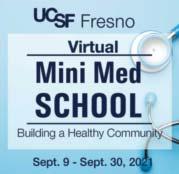

elsewhere, registered for this series of community lectures. An annual favorite, the 10th installment of Mini Med School shared the latest trends and topics in health care and medicine with general audiences. Subjects included: Multispecialty Care in the Emergency Department, Violence/Trauma and the Impact on Our Community, The Importance of Maternal and Baby Health, and a Medical Student, Resident Physician, and Health Professionals Panel. Sukhjit Dhillon, MD, clinical instructor in the Department of Emergency Medicine, was the program director.
The Third Annual UCSF Fresno Liver Expo was held virtually on Oct. 2, 2021. This community event focused on Liver Health and the COVID-19 Pandemic, Pancreatic Cancer Awareness, and steps attendees could take to improve liver health. In addition to liver health lectures, the expo included an exercise class hosted by Tim Clark, Director of Fitness at Community Medical Center and cooking demo from Matthew Crum, Executive Chef, Community Regional Medical Center. About 200 people participated online. Marina Roytman, MD, Director of the UCSF Fresno Liver Program, was the program director.
The UCSF Fresno Office of Diversity and Outreach hosted the first installment of the new UCSF Fresno Health Equity Symposium series on Friday, Nov. 12, 2021: The Advancing Excellence in LGBTQ+ Health Symposium. This day-long conference featured experts from a wide variety of fields including physicians, surgeons, and mental health professionals who were specialists in LGBTQIA+ care. Attendees learned about gender affirming
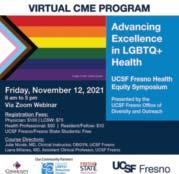
opportunities to improve medical practices in an area where the demand for care is greatly needed. Julie Nicole, MD (She/Her/Hers) Clinical Instructor, OB/GYN, and Andrea Long, MD, FACS, (She/Her/Hers), Assistant Clinical Professor, UCSF, Diversity Director, UCSF Fresno, were the program directors.
To increase awareness and improve heart health among women of all ages, UCSF Fresno hosted the Women’s Heart Fair at Home on Feb. 26, 2022. This year’s Women’s Heart Fair was a virtual version and represented the seventh annual community event. Over 200 people took part online. In addition to hearing from experts in heart health: Drs. Teresa Daniele, MD, FACC, chief of cardiology, UCSF Fresno; Felice Lin, MD, heart failure cardiologist, University Cardiovascular Center; and Heidi J. Reich, MD, cardiothoracic surgeon, Central California Heart and Lung Surgery, participants joined in a yoga class and guided meditation led by Dr. Diane Dimon, Founder and Director, Matters of the Mind. Dr. Daniele was the program director.

The Third Annual Autism Symposium for Primary Care Providers was held online on March 26, 2022. Led by foremost experts and co-hosted by the Central Valley Regional Center, this virtual program gave providers and allied health professionals the information and tools needed to initiate early diagnosis, intervention and provide community support resources for children with autism or related neurodevelopmental disorders. Keynote speaker Roger Scott Akins, DO, of the UC Davis MIND Institute, discussed Early Diagnosis of Autism and Related Disorders Including by Telemedicine. Over 140 health care professionals participated. Patrick Shea, MD, UCSF Fresno, assistant clinical professor, UCSF Department of Psychiatry, was the program director.
On Thursday, April 21, 2022, UCSF Fresno hosted the International Advances in SARS-CoV-2 and CoVID-19 Town Hall Lecture. This informative event presented lecturers from
around the world and was created to understand and define the unique properties of SARS-CoV-2 that impact human and animal welfare and how basic science models are used to study potential evolutionary stressors. Expert speakers included: Peter Jüni, MD, FESC, scientific director, Ontario COVID-19 Science Advisory Table; Anthony Gordon, MD, professor of anesthesia and Critical Care, Imperial College London; and Angela Rasmussen, PhD, Vaccine and Infectious Disease Organization (VIDO), University of Saskatchewan; Fernando Teixeira, MD, assistant professor, UCSF Fresno, Emergency Medicine, was the program director.

From April 25 – 27, the 2022 High Sierra Wilderness and Travel Medicine Conference returned to the Pines Resort at Bass Lake. Over 80 people were in attendance to learn about all things Wilderness Medicine. Each day consisted of lectures and hands-on breakout sessions. Drs. Susanne Spano, Danielle Campagne, Michelle Storkan, and Janak Acharya were lecturers at the conference. James McCue, MD, assistant professor of Clinical Emergency Medicine and Cyrus Haselman, MD, clinical instructor, were the program directors.
Celebrating its 17th year, the Cardiology in the Valley Symposium was hosted virtually on May 14, 2022, and was attended by nearly 100 physicians and allied health providers. The 2022 symposium covered recent advances and updated guidelines in various disciplines of cardiovascular disease that have replaced prior concepts that had been considered “state of the art”, including updates in Coronary Artery Disease, Cardiovascular Imaging, Heart Failure, Electrophysiology and Structural Heart Disease. John Ambrose, MD, professor of Medicine, was the program director.
 By Amanda De Lima Croft, UCSF Fresno Wellness
By Amanda De Lima Croft, UCSF Fresno Wellness
The mission of the UCSF Fresno Wellness and Community program is to empower all members of our community to achieve a more balanced approach to their wellness by providing guidance, tools and support. We hope to achieve this by promoting the eight elements of wellness: emotional, social, financial, career, environmental, intellectual, and spiritual wellness.
To help drive decisions and carry out this mission, the UCSF Fresno Wellness and Community team created four overarching goals in the program and implemented data-driven well-being initiatives within each of these areas over the past year. The four goals are to: 1) Deliver innovative programs and services at the individual and community level that support the eight dimensions of wellness for the UCSF Fresno Community, 2) Integrate evidence-based wellness practices into curricular education, research, and professional development, 3) Foster a safe, supportive, and inclusive environment, and
4) Build and maintain collaborative opportunities with campus and community partners to bolster wellness for the UCSF Fresno community.
Over this past year, some of the well-being initiatives we carried out included:
• Establishing an annual comprehensive wellness survey to be used to draw data
• Continuing to provide virtual yoga and recorded yoga sessions to our community
• Instituting the Early Alert Program on-campus, an opt-in bi-weekly wellness check-in via text messaging service provided by a third-party organization to UCSF Fresno staff, residents/fellows, and faculty with tailored wellness support based on needs
• Revamping the UCSF Fresno Wellness website to include a centralized wellness calendar, wellness resources, and programs in one place
• Allocating $25,000 of wellness funding received from UCSF to 34 programs and departments to use on wellness initiatives.
Another well-being initiative we’ve implemented this year was connecting our employees to our greater community through the use of discounts. We are grateful to the organizations who have generously partnered with us this year by providing a discount to our employees: GB3 Gym, MetalMark Climbing Gym, Roger Rocka’s Dinner Theater, Four Corners Yoga, and Fresno Bar Method.

Finally, we’ve promoted several events on our campus to help foster social wellness ranging from virtual to in-person gatherings. Our virtual events included virtual yoga during the evening and lunchtime, as well as a virtual art therapy, attended by members within UCSF Fresno and Community Health System. We continued our Win with Walking Challenge from December 2021 - February 2022 and had a total of 176 participants join teams and participate in the competition.
Our in-person events consisted of yoga offerings offered by our incredible librarian and yoga instructor, Sharon McClain, the Health Care Hero Appreciation Event in October 2021 attended by over 300 people with food trucks and gifts; a Resident/Fellow Appreciation Day in February 2022 attended by nearly 200 residents/fellows; and a UCSF Fresno Employee Appreciation event in May 2022 where we provided lunch to all attendees. We also had a local coffee truck come to campus weekly for six weeks upon staff’s return to a hybrid work schedule.
Our final event of the year was Gardening Day in June 2022, where the Garden Committee, in collaboration with the Wellness Program and the UCSF Fresno Facilities team, kicked off the garden on the second and third floor balconies by inviting members of our campus to plant herbs together. The garden has blooming flowers, herbs, and citrus trees for all to share through the years.
The UCSF Fresno Wellness and Community program is excited to continue advancing well-being initiatives within our community with the support of the LIVE Committee and the wellness champions on our campus.

The newly redesigned Hildebrand Medical Library at UCSF Fresno opened to faculty, learners and staff in 2021-2022 and quickly has become a space for study, collaboration, research, creativity and relaxation.

New features include a reconfigured space for computer stations, laptops, treadmill desks, a quiet pod, a modular meeting room, an Innovations Lab, a Maker’s Lab with 3D printer and scanner and a 3D virtual reality station.
The library is proud to showcase “The Future of Medicine in the San Joaquin Valley,” artwork created by Dr. Alfredo Ponce, an internationally known artist and local educator from Fresno County. The artwork, commissioned by UCSF Fresno, represents the UCSF San Joaquin Valley Program in Medical Education (SJV PRIME) medical students. SJV PRIME is a tailored track at the UCSF School of Medicine for medical students who are committed to ensuring high quality, diverse and well distributed medical care to improve health for populations, communities and individuals in the Valley.
The library renovations have transformed the 20-year-old medical library, which was made possible through state funding that supports the SJV PRIME program, as well as a generous donation in 2002 from Dr. and Mrs. Edward Hildebrand. Dr. Hildebrand was a long-time Fresno resident with a passion for medical science and education.
In 2021-2022, the library transitioned to an online collection due to a steady decline in book circulation (less than 1%) and the preference of e-books over print. The UCSF Fresno Hildebrand Medical Library will continue to support a limited number of text materials in circulation with a copyright of less than five years. The changes have transformed the library into a place that provides ample space for study and reflection. Inside the main space of the library, four rooms can be reserved as quiet, study rooms and a “quiet pod” in the center of the library is available.
A modular wall around the front desk area of the library provides a quiet space for Sharon McClain, C-IAYT, medical library professional, and Robyn Aguiar, MSLS, medical library professional, to talk with patrons. The front desk area also has space for an archival room that includes a photo scanner and document scanner allowing for the creation and management of an institutional archival system.
At the back of the library, an Innovations Lab provides a room for workshops and hands-on activities. The Innovations Lab includes robotics kits, crochet, knitting, jewelry and beading supplies – and a sewing machine. A 3D printer and 3D scanner are available for patrons to create simulated heart valves or other prosthetics.
The library also has a room with a green screen for video interviews and a podcasting station with podcasting microphone equipment.
The redesigned library has become a place for studying, collaboration and for creative, innovative activities,” said Emy Lopez Phillips, medical director at UCSF Fresno. “And the treadmill desks are getting a workout,” she said.


UCSF Fresno continues to provide learning opportunities for medical students and trainees with state-of-the art improvements to the Clinical Skills Lab, which provides a safe environment for students, residents and fellows to learn and practice procedural skills, sharpen decision-making processes and build team leadership abilities.
Through role play and hands-on experience in a variety of simulated clinical environments, learners acquire knowledge, skills and attitudes needed for caring for patients in the real world. Learning activities cover the entire spectrum of patient care, from practice of history taking and physical examination to inter-professional team training and procedural skills practice. In 2021-2022, the Clinical Skills Lab at UCSF Fresno responded to increased needs for providing clinical experiences due to COVID-19 restrictions. Faculty relied more heavily on simulation to anchor their curriculum for students and trainees. An expansion of the Skills Lab allows for scenario-based training sessions, with reduced group sizes providing for social distancing. Separate simulation rooms are dedicated for Emergency Medicine/Surgery/ICU scenarios and for OB/GYN/Pediatric scenarios.
In 2021, Amy Kwok, MD, associate clinical professor of Surgery and Jessica Fujimoto, MD, clinical instructor of Emergency Medicine, were named to co-lead the Simulation Center to define its mission and guide its teaching and research goals. A new clinical skills and simulation technician, Mark Hammes, has been hired to work with Lee Hagerty, the simulation education coordinator, to manage, operate and maintain the Simulation Center’s advanced technology systems and vast array of simulation equipment.
The installation of a SimCapture™ learning management system has provided advanced education, assessment and training experiences in Graduate Medical Education. The state-of-the-art audio-visual and software system is designed especially for medical education and allows recording of each training session from multiple camera angles and includes data from patient monitors. These recordings can be reviewed and debriefed by faculty and trainees.
The SimCapture™ learning management system also gives medical students in the San Joaquin Valley Program in Medical Education (SJV PRIME) an assessment equitable to that at the UCSF School of Medicine.
The UCSF Fresno Clinical Skills Lab and Simulation Center boasts three high-fidelity mannequins that provide interactive learning opportunities for medical students, as well as training experiences for residents and fellows. A variety of specialized simulators called task trainers help learners practice a specific skill using lifelike models of parts of the human anatomy such as the head and neck, the torso, or an arm.
The mannequins also are used in community outreach, helping educate Emergency Medical Services (EMS) community partners at American Ambulance and to educate local high school students in the Doctors Academy program. UCSF Fresno’s Parkmedic Primary Certification Course uses the Simulation Center to provide park rangers with specialized medical training to create a safer environment for National Park visitors and employees across the country. And students in the Summer Biomedical Internship (SBI) for incoming high school seniors from Fresno County received hands-on experiences in suturing and cardiac arrest resuscitation at the Simulation Center. SBI is a health career pathway program matching students with faculty members who have or are developing research projects over the summer.
A new childbirth simulator mannequin, made possible by a grant from the Isnardi Foundation, is known as “Victoria,” and provides for simulations of a full range of obstetrical events to mimic human anatomy and physiology and create more realistic clinical scenarios. Trainees can experience true-to-life delivery and other OB/GYN scenarios while an integrated array of sensors tracks their performance for review later.
Demand for the use of Victoria has increased greatly this past year. The UCSF Fresno OB/GYN program holds regular training sessions for its residents with Victoria as their patient. Using the Simulation Center’s operating room suites, they practice skills including IUD placement, Caesarean (C-section) deliveries and other difficult labor and delivery scenarios. Trainees in the Department of Emergency Medicine Residency Program utilize Victoria for C-section skills training and other emergency medical care scenarios. American Ambulance providers use many of Victoria’s built-in features to learn new protocols required for their critical care transport teams and to meet required EMS competencies.
Drs. Fujimoto and Kwok said the dramatic changes to the Clinical Skills Lab are only the beginning of planned expansions and advancements that revolutionize the uses of simulation in the training of medical students, residents and fellows.


The UCSF Fresno Mobile HeaL COVID-19 Equity Project (CEP) has become the largest drive-thru, free clinic for testing, vaccine administration and treatment of SARS-CoV2, serving the most vulnerable and underserved populations in Fresno County.

And through partnerships with community-based organizations, UCSF Fresno Mobile HeaL has held hundreds of mobile testing, vaccine, therapy and treatment events in neighborhoods throughout the city and county.

From August 2020 through June 30, 2022, CEP gave more than 88,000 COVID-19 tests, nearly 75,000 vaccines were administered and nearly 600 people received monoclonal antibody therapy and anti-viral prevention treatment for the coronavirus. About 80% of people receiving services at CEP identified as people of color.
Since August 2020, when the City of Fresno approached UCSF Fresno and community-based organizations to provide free COVID-19 tests, outreach, contact tracing and social support and provided $5 million in CARES Act funds – and ultimately with Fresno County providing additional funding for vaccines, therapy and treatment – UCSF Fresno Mobile HeaL CEP became a vital partner and leader in the pandemic fight.
As pandemic circumstances evolved, UCSF Fresno quickly expanded CEP services to meet new needs for prevention and therapy. Beginning in February 2022, CEP began providing free, accessible monoclonal antibody therapy for adolescents and adults with moderate to severe compromised immune systems and for those who had an allergic response to COVID-19 vaccine. Evusheld, a longacting antibody combination for pre-exposure prevention of COVID-19, helps people with weakened immune systems mount a strong immune response to the coronavirus. Fresno County estimates that 30,000 residents could benefit from the therapy.
In May 2022, CEP began administering the oral antiviral medication, Paxlovid, used to treat mild-to-moderate COVID-19 in adults and pediatric patients 12 years of age and older who are at high risk for progression to severe COVID-19, including hospitalization or death.
UCSF Fresno purposely created a free, no insurance, no-appointment model for testing and vaccine to eliminate barriers to health access experienced most often by people of color, such as transportation constraints, limited English proficiency, and limited technological literacy or no computer access. “We really did not want to do an appointment system because it really didn’t fit the mission to serve the underserved and vulnerable population,” said Kenny Banh, MD, assistant dean of undergraduate medical education and CEP medical director.
UCSF Fresno, a regional campus of the UCSF School of Medicine, was uniquely positioned to quickly begin COVID-19 testing and vaccine injections. In 2018, Dr. Banh started a mobile health service for the central San Joaquin Valley. UCSF Fresno’s Mobile Health and Learning (HeaL) provides flu shots and health screenings for patients while providing learning opportunities for medical students and pre-health students under the guidance of medical residents and faculty physicians. In addition to training physicians and teaching medical students and providing clinical and volunteer experiences for pre-health students, UCSF Fresno is committed to improving the health of the San Joaquin Valley, and Mobile HeaL and now CEP, are means of providing needed care outside of hospital and clinic walls, said UCSF Fresno Associate Dean Michael W. Peterson, MD, FCCP, MACP.
The UCSF Fresno Mobile HeaL (CEP) has also become a valued training ground for future health professionals. UCSF Fresno’s mission is to provide high-quality health care but also to train the next generation of physicians for the San Joaquin Valley. CEP consciously hires diverse people from the Valley who are representative of the patients being served. The staff of vaccine support specialists understand the people who are being served and communicate to and provide care in a culturally appropriate manner.
A unique podcast for paramedics and EMTS (emergency medical technicians) produced by American Ambulance and hosted by UCSF Fresno Emergency Medicine physicians has won statewide acclaim and drawn listeners from as far away as Alaska and Australia.
The American Ambulance EMS podcast received the California Ambulance Association Services Excellence (CAASE) Award for Innovation in EMS in 2021, and an episode about amputations ranked among the Top 12 podcasts in 2021.
The Innovation Award recognized the unique partnership between American Ambulance and UCSF Fresno physicians Danielle Campagne, MD, FACEP, vice chair of Emergency Medicine at UCSF Fresno, UCSF associate professor of Emergency Medicine and American Ambulance medical director; Patil Armenian, UCSF associate professor of Emergency Medicine and co-director of Toxicology at UCSF Fresno; and Saajan Bhakta, DO, UCSF Fresno fourth-year Emergency Medicine resident. “I listen to a lot of EMS (Emergency Medical Services) podcasts and sometimes they include the medical director, but I have not found one with three physicians dedicated to each and every podcast,” said Steve Melander, chief operations officer at American Ambulance.
The podcast has been well received, Melander said. “What makes it so good is you have those three physicians with various backgrounds and experiences.”
Melander got the idea of starting an EMS podcast two years ago. He had been looking for a new way for EMS field staff to receive educational information. He pitched the idea of a podcast to Dr. Campagne, who initially hesitated. “I am not a techy,” she explained. But she mentioned the concept to her colleague, Dr. Armenian. “I love podcasts and I listen to podcasts all of the time,” Dr. Armenian said. “I told Dr. Campagne, ‘we’re doing the podcast and I’m doing it with you.’” The professors brought aboard Dr. Bhakta, who has an interest in pre-hospital and disaster medicine – and who is an avid podcast listener. Melander tapped John-Mark
Bergen, multi-media arts specialist at American Ambulance, to produce the podcast.
The first episode of American Ambulance EMS aired in April 2020 – a month after the World Health Organization proclaimed COVID-19 a pandemic. “It was perfect timing for what we needed for EMS education locally and nationally,” said Dr. Campagne. “We can’t get people in a room together and it is difficult to coordinate schedules to do EMS education on Zoom.” Field staff can listen to episodes on shifts while driving or at times of their convenience. Episodes are recorded in the ambulance company’s conference room, which has space for the physicians to maintain social distance. “The mics are spread out as far as they can and still be plugged into my computer,” Bergen said. “And we’re all masked up,” said Dr. Armenian.
The physicians had recorded 60 episodes as of December 2021. They record up to three episodes at one sitting and take turns as content director. Research is done for each topic and an outline of the contents is created prior to the recording. The preparation allows for a conversation among themselves and with a guest instead of giving a lecture about the evidence-based research and practices. Dr. Campagne is comfortable with the format. “It’s not recorded live – we can make edits – and John-Mark makes us sound good. “It’s turned out to be very fun,” she said.

Podcast topics have ranged from anaphylaxis (a severe, life-threatening allergic reaction) to dental emergencies, stroke and hypothermic cardiac arrest. They also have included a discussion about PTSD (Post Traumatic Stress Disorder). “Some of the episodes are very medical, such as how to stop bleeding, but some episodes look at the super-fast decision making and innerworkings of an EMS system,” Dr. Armenian said.
American Ambulance paramedics are often guests on the podcast. “We like to highlight the unsung heroes,” Dr. Campagne said. EMS field staff provide a lot of the experience in the community, Dr. Bhakta said. “We have episodes where we interview the most experienced medics
out there. And they have been great sources for ideas and topics and experiences to talk about.”
Bergen looks forward to recording Drs. Campagne, Armenian and Bhakta. “It’s an awesome group,”’ and the topics are interesting. “It has been really eye-opening for me. You can think that you’re not a doctor or a paramedic and that there is ‘nothing for me here,’ but I actually understand and appreciate the podcast and I learn something every time. It’s accessible,” he said.
“American Ambulance has a desire not only to provide valuable information to our employees who serve our community, but to anyone working in EMS and emergency medicine,” said Erik S. Peterson, Esq., general manager at American Ambulance. The dedication of Dr. Campagne and the other doctors and her guests has been inspiring. Certainly, some of our content is considered in the context of our local policies, but they have covered many topics that even the general public may benefit from. We are grateful. It has been an exciting program and we are excited we can offer it.”
Dr. Armenian appreciates the commitment that American Ambulance has shown the podcast team. “They are supportive of our creativity,” she said. And Dr. Bhakta said, “it’s a great collaboration and I’m excited to be doing it.” Dr. Campagne has been medical director at American Ambulance for the past 2 ½ years and said UCSF Fresno values its relationship with American Ambulance. “We are a unique collaborative partnership,” she said.
The VA Central California Health Care System, an affiliated partner of UCSF Fresno, recently became the first institution in Central California to receive a Geriatric Emergency Department (GED) accreditation.
“We sought the accreditation to improve patient outcomes, provide standardized approaches to care that basically address very common complaints for patients who are geriatric in age,” said Manavjeet S. Sidhu, MD, MBA, a UCSF Fresno emergency physician, and the Emergency Department (ED) director at the VA.
GED accreditation by the American College of Emergency Physicians (ACEP) also “ensures that there is optimal transition of care from the ER to other areas, such as the inpatient setting, the home or community-based care, which a lot of our veterans use,” Dr. Sidhu said.

Geriatric patients in the VA’s Emergency Department are assured of ready access to wheelchairs, walkers and other ability aids and transportation to either their homes or other care facilities, for example, Dr. Sidhu said. “We have essentially worked on ways so there is less of a burden for not just the veteran, but the veteran’s family members.”
“Preparing for accreditation allows the hospital and ED to focus on the needs of this complex and growing population and to ensure that the resources available to the ED meet the needs of the patients they serve, said Nicole Tidwell, Geriatric Emergency Department Accreditation program director at ACEP. “Early data from existing models of geriatric emergency care – models that promote best clinical practices and create a more positive and sensitive physical environment – show they have the potential to improve
health outcomes, coordinate care more effectively, and reduce costs. In sum, GED accreditation signals to the public that accredited institutions are focused on the highest standards of care for their community’s older adults. Standards of care that can make Grandma and Grandpa rest easy knowing they are in good hands,” she said.
In addition to providing veterans with optimal care, the GED accreditation at the VA in Fresno provides opportunities for residents at UCSF Fresno to learn the delivery of excellent geriatric patient care. As a regional graduate and undergraduate medical education campus of the UCSF School of Medicine, UCSF Fresno conducts its training and patient care through a network of affiliated partners. Medical students, residents and fellows work and train in a variety of training sites and the VA Central California Health Care System is a valued training facility.
“At the VA, one of our pillars is medical education,” Dr. Sidhu said. UCSF Fresno interns, (first-year residents in Internal Medicine), rotate for two weeks at the VA Emergency Department. In their second and third year of training, residents admit patients to the VA hospital under supervision of attending faculty physicians. UCSF Fresno fellows, who are in advanced training in cardiology, gastroenterology, among other specialties, are on call to see patients in the hospital.
“Fellows, as well as residents are able to learn from our patient population, and vice versa, our patient population is really able to take away a lot from our residents and fellows,” Dr. Sidhu said.
Achieving GED accreditation became one of Dr. Sidhu’s first projects in August 2020, when he accepted the position of director of the Emergency Department at the VA. Dr. Sidhu is an alumnus of the Emergency Medicine Residency Program at UCSF Fresno, where he was chief resident.
Dr. Sidhu was instrumental in the VA’s successful application for GED accreditation, said Will McCullough, public affairs officer at the VA Central California Health Care System. “He has been a wonderful addition to our facility, our health care system. And we’re very happy to have him aboard,” McCullough said.
The accreditation process involved physicians, nurse champions, and people in many other areas of the hospital, Dr. Sidhu said. “It was a huge team effort.”

The VA Central California Health Care System is very proud of Dr. Sidhu and the entire Emergency Department team and what they have been able to accomplish in a very short period, McCullough said. “The designation is a milestone, when you consider there are only about 300 health care systems across the country which have achieved this particular status,” he said.
“Accreditation signals to our community that our institution focuses on a high standard of care for our communities’ older adults,” Dr. Sidhu said. “Fortunately, UCSF Fresno Internal Medicine residents have the opportunity to rotate with our ED providers and work in an ED that meets the interdisciplinary geriatric standards set forth by the American College of Emergency Physicians.”
In June 2022, the California Medicine Scholars Program (CMSP) launched as part of a statewide strategy and investment by the Department of Health Care Access and Information to strengthen the California community college to medical school pathway. As its first established action, CMSP, housed at the Foundation for California Community Colleges, awarded funds to four recipients to establish Regional Hubs of Healthcare Opportunity (RHHOs), which will bridge gaps between community colleges, four-year universities, medical schools, and community-based health clinics and organizations to provide greater pre-medical opportunities for students and help diversify California’s primary care physician workforce.
The four awards were made to:
• UCSF Fresno, a regional campus of the UCSF School of Medicine
• UC Davis School of Medicine
• UC Riverside School of Medicine, and
• UC San Diego School of Medicine
All hubs reside in regions underserved in health care and are currently experiencing a physician shortage. Each grantee will receive $1.6 million for the first three years ($540,000 annually) with additional funding ($250,000) available in the fourth year for sustainability. Funding will support the creation of RHHOs and provide a strategy to increase the number of underrepresented minority physicians and ultimately reduce disparities in health and health outcomes across the state.
UCSF Fresno is the lead agency for the San Joaquin Valley Regional Hub of Healthcare Opportunity (SJV-RHHO). The SJV-RHHO, which launched July 1, 2022, creates the first pre-medical diversity pathway from community college to primary care physician program in the San Joaquin Valley known as the California Medicine Scholars Program (SJV-CMSP).
“The vision of the SJV-CMSP is to increase the numbers of underrepresented minority physicians through a collaborative partnership effort. This program fulfills a need in the pathway to practicing physician at the community college level,” said Kenny Banh, MD, assistant dean for Undergraduate Medical Education at UCSF Fresno. “The mission specifically is to increase the number of regional community college students who transfer to and are accepted into medical schools from California State University, Fresno.”
In addition to UCSF Fresno, SJV-CMSP partners include:
• California Health Sciences University
• Fresno State
• State Center Community College District (Fresno City College, Clovis Community College, Madera/Oakhurst Community College, Reedley Community College)
• College of the Sequoias (Hanford, Tulare and Visalia campuses)

• Merced Community College District (Merced and Los Banos campuses)
• West Hills Community College District (Coalinga, Firebaugh and Lemoore campuses)
• Yosemite Community College District (Columbia College and Modesto Junior College)
• California Area Health Education Center Program
• Central Valley Health Network, and
• Valley Health Team Family Residency Medicine Program.
Students applying to the SJV-CMSP must be on track to complete at least 22 credits at their community college, plan on applying to Fresno State the following academic year, come from an economically or educationally disadvantaged background; have an overall GPA of 3.30 or higher (transcripts must be submitted); provide a personal statement and letter of recommendation as well as take part in a personal interview and demonstrate a commitment to participate in SJV-CMSP activities to pursue a career as a physician.
The selection process into SJV-CMSP will be completed by a local committee. Selected students will be provided with
academic support through advising from the identified pre-health college advisors at all partner colleges, starting with the community college and then transitioning to advising by Fresno State faculty as well as other enrichment opportunities such as conferences, academic skills workshops, medical school application workshops, mentoring and clinical experiences with a special focus on facilitating student matriculation and preparedness for medical school.
UCSF Fresno already implements several programs aimed at inspiring, informing, and academically preparing students, especially those from underrepresented backgrounds for careers in health and medicine. These include the highly successful Doctors Academy programs at Caruthers and Sunnyside high schools in Caruthers Unified School District and Fresno Unified School District respectively; the Summer Biomedical Internship Program; Mini-Medical School and Reaching Out to Aspiring Doctors for the San Joaquin Valley among other programs.
“Developing a high-quality undergraduate medical education program and the foundation for a future medical school requires that enough qualified students from the region are available to be recruited to the program,” said Michael W. Peterson, MD, associate dean for Undergraduate Medical Education and Research at UCSF Fresno. “Improving efficiencies and developing financial sustainability of pathway programs are essential to continue the tremendous momentum and success we have accomplished to date with programs like the Doctors Academy built by our very own Katherine A. Flores, MD, and to expand to serve community college students with the SJV-CMSP.”
To better coordinate and increase the success of existing pathway programs, SJV-CMSP and future programs, Associate Dean Peterson and Assistant Dean Banh announced that UCSF Fresno is creating an Office of Health Career Pathways within the Department of Undergraduate Medical Education. Emy Lopez Phillips, EdD, has been appointed as the inaugural Director. Dr. Lopez Phillips will oversee the SJV-CMSP and provide administrative oversight to all UCSF Fresno pathway programs. Her responsibilities will include budget development, fiscal management, coordination of student volunteer experiences, representing UCSF Fresno to community-based organizations and educational institutions and districts to support health and medical educational career opportunities for students.
“I am honored to build upon the success of existing programs and launch new ones like the San Joaquin Valley California Medicine Scholars Program that will expand access to careers in health and medicine for community college students,” said Dr. Lopez Phillips. “The young people in our Valley are full of hope and resilience. Many have a strong desire to give back to their communities and break the cycle of poverty within their families. This is an exciting time as we at UCSF Fresno along with our partners have an opportunity to help lift and mentor the next generation.”
The California Statewide Area Health Education Center (AHEC) Program, housed and administered at the UCSF Fresno Department of Family and Community Medicine, is celebrating 50 years of recruitment, training, and retention of health professionals for under resourced communities.
California AHEC was established in 1972 as part of the National AHEC Program developed by Congress. The AHEC mission in California is to improve access to quality health care for underserved populations in urban and rural communities through academic and community partnerships. Health care workforce development is crucial in California, especially in the San Joaquin Valley, which has the second-lowest rate of primary care physicians per 100,000 population in the state.
California AHEC receives federal funding through state initiatives and from the Bureau of Health Workforce under the Health Resources and Services Administration (HRSA). UCSF Fresno administers the funding and subcontracts with a network of 12 AHEC centers, serving 58 counties, located in under resourced areas of the state to provide population-based education and training for students and health professionals. Each center, in collaboration with their regional advisory boards develops programs to respond to specific health care workforce needs of the community. The AHEC centers conduct their programs through many educational, clinical and community partnerships.
“California is a large, diverse state with health care workforce shortages and challenges that are as varied as the state’s geography. Addressing disparate workforce needs requires a collaborative spirit that AHEC has engendered to achieve,” said

Ivan Gomez, MD, program director and principal investigator of AHEC, and Chief of the UCSF Fresno Department of Family and Community Medicine. “Statewide, each AHEC center has developed activities that respond to individual community health workforce priorities and opportunities, all the while engaging with each other to share ideas and best practices. We, at the AHEC Program Office at UCSF Fresno, are proud to help facilitate our partners in their efforts to improve access to quality and culturally competent health care to people in under resourced regions of the state.”
In the past three fiscal years (2018-21), California AHEC has provided professional education and support to 16,318 participants; health careers promotion and preparation to 15,893; and 1,922 in rotations, clerkships, internships and community experiences.
The AHEC Program Office coordinates the implementation of our program objectives through our 12 centers. The program office provides technical assistance, webinar development, and promotes collaboration with our state partners. “We collaborate with our AHEC centers to provide the training and education that are needed in our regions,” said JD Garza, AHEC Associate Program Director.
For example, the Central Coast AHEC, housed at the non-profit Health Projects Center (HPC) in Santa Cruz, California, focuses on increasing the number of health professionals trained to care for the state’s rapidly growing geriatric population. “Our nonprofit is dedicated to keeping older adults and people with disabilities safe at home,” said John Beleutz, MPH, Central Coast AHEC Director. Central Coast AHEC trains Family Medicine residents from Natividad Medical Center in Salinas, California, and nursing students
from Cabrillo College in Aptos, California, through clinical and community rotations, teaching and simulations. Health professionals from area community health centers also receive continuing education in chronic disease care and geriatrics.
“Our biggest pipeline for new social workers at the Health Projects Center is our internship program that is in part supported by AHEC to allow us to give those folks experience. Many of them are bilingual, bicultural, from diverse backgrounds, and we’re retaining them,” Beleutz said.
The Central Valley AHEC, hosted by the Central Valley Health Network (CVHN), is focused on collaborative workforce development activities to address member health centers’ needs in the areas of recruitment, retention and on-going staff development. CVHN is comprised of 14 Federally Qualified Health Centers (FQHCs), which serve 21 counties in California. FQHCs serve people of all ages, races and ethnicities and people without insurance.
“Workforce development has long been one of our primary strategic initiatives,” said CVHN Chief Operation Officer and Central Valley AHEC Director Mary Renner.
All 12 AHEC centers in California participate in the AHEC Scholars Program in Community Health, which launched in 2018 for high-potential health professions students in the health professions to experience primary care with an emphasis on community health and interdisciplinary practice in medically under resourced communities. “We have grown AHEC Scholars over the last three years. We have been able to enroll over 530 students to date,” Garza said.
UCSF San Joaquin Valley Program in Medical Education (SJV PRIME) participates in the AHEC Scholars Program, serving as mentors and role models for youths in the Central Valley. SJV PRIME is a tailored track at UCSF for medical students who are committed to ensuring high quality, diverse and well distributed medical care to improve the health of communities and individuals in the San Joaquin Valley.
Amitoj Singh, an SJV PRIME student from Fresno, said participating in the AHEC Scholars Program allowed him to gain additional knowledge and experience in underserved settings. “During my involvement, I was able to educate community members in the Central Valley about chronic health issues like diabetes, engage in research on the relationship between COVID-19 and asthma, and create mental health resources that were distributed at Camarena Health (a Maderabased Community Health Center) Fairs. To all health
professional students who are interested in working with marginalized communities, I highly recommend participating in this program.”
The AHEC Scholars Program has been successful for the South Bay AHEC said Jesse Tarango, South Bay AHEC Director. The South Bay AHEC is hosted by the Community Health Partnership (CHP), a community clinic consortium of 10 community health centers with 41 sites serving Santa Clara and San Mateo counties. AHEC Scholars are placed in the health centers and three graduates of the AHEC Scholars Program were hired by health centers this past year. “We’re getting great feedback from the CEOs,” Tarango said.
The Central Valley AHEC has expanded its AHEC Scholars Program to include high school students. “Even though initially the idea of AHEC Scholars was for medical students, as the program evolved across the country, people realized it really needed to be broader than that,” Renner said. “We have a couple of high schools that we work with in Madera around certified nursing assistant programs, and a high school in the Sacramento area, we work with on its community health worker program.”
“The California AHEC has five partners that provide the latest information about health professional workforce development and share information about available resources with AHEC centers,” Garza said.
The partners are California Primary Care Association; California State Office of Rural Health; California Department of Health Care Access and Information (HCAI); California Community Colleges – Workforce & Economic Development Division; California State University Office of the Chancellor.
“For example, through its partnership with the California State Office of Rural Health, California AHEC has received a five-year grant for workforce resiliency. As a result, AHEC centers across the state will be able to provide services to address burnout among health profession students and health professionals. Burnout is a primary factor in health professionals leaving their field and we want to mitigate that by providing resources with the goal of having them stay on board with the community health center consortia they are working with,” Garza said.
“The California AHEC is grateful for its partners and the network of centers,” Garza said. “Through collaboration we are achieving the goal of recruiting, training and retaining health professionals. And that is the overarching mission of the California AHEC.”
an assistant clinical professor. Dr. Ernst became Director of Global Health in July 2021, succeeding Emergency Medicine physician Rais Vohra, MD, who in addition to being a faculty member at UCSF Fresno is serving as interim Fresno County public health officer.
Increasing participation in global health activities at UCSF Fresno is a goal of Dr. Ernst’s, and an informational dinner for faculty and residents was held in June 2022. He is hoping to encourage more residents to pursue global health projects, such as fourth-year Emergency Medicine (EM) resident, Brandon Kuang, MD, who developed an Area of Concentration (AOC) in global EM education. Dr. Kuang gave virtual lectures to physician colleagues in Nairobi, Kenya, and Ho Chi Minh City, Vietnam, Dr. Ernst says. Dr. Kuang also enrolled to attend the Consortium of Universities for Global Health virtual global health conference this year.
Improving health and reducing the burden of disease in vulnerable populations worldwide is a commitment of the UCSF School of Medicine, and as a regional campus, UCSF Fresno embraces that mission, especially as the San Joaquin Valley’s diverse population provides a window into how interconnected we are globally.
“People do not live in a microbiologic or socioeconomic world that can be clearly delineated by national borders. A virus that originates in China can impact the entire world. Community violence in Central America impacts the patients we see here in Fresno,” said Ryan Ernst, MD, the new director for Global Health Education at UCSF Fresno.
Global health education has been available at UCSF Fresno for more than a dozen years or so. A Global Health sub-committee meets regularly, however, this past year COVID-19 restrictions severely limited international and regional travel for global health activities. UCSF Fresno pivoted and continued with many educational projects online that Dr. Ernst initiated in the UCSF Fresno Department of Emergency Medicine where he is
No travel funds could be used for residents or for Dr. Ernst, but he traveled independently for projects he was working on that required ongoing support and education. “I can’t allow these projects to be unreliable or inconsistent – establishing reliable longitudinal relationships is imperative in this work,” he said. In March 2022, he traveled to Ho Chi Minh City, Vietnam. “I’ve been working with hospital/physician colleagues there since 2015, in a multi-university collaboration. In November 2019, we gained acceptance from the Ministry of Health to implement an 18-month Emergency Medicine diploma program. This is the first formal training in Emergency Medicine in the south of the country and is centered in the large trauma hospital in Cho Ray, in the heart of the Cholon district.” The first three physicians graduated in early April 2022 and a new class was welcomed, he says.
Advancing education is essential in global health, Dr. Ernst said. “My experience has often been that my expertise as a clinician is of limited use internationally, but my ability to use that expertise toward education and training can create a long term, sustainable, and mutually beneficial relationship,” he says.
Dr. Ernst continues to maintain educational projects in not only Ho Chi Minh City, but in Nairobi Kenya, as well as in Guatemala City, Guatemala. In December of 2021, along with colleagues from other universities, he returned to Guatemala City where he helps organize the orientation week for incoming emergency medicine residents. “We collaborate with not only American physicians, but physicians from around Latin America to create

an interactive and innovative week of education.”
The emergency medicine residency in Guatemala is relatively new and will be graduating its first class of residents this year. All these relationships and experiences will be integral in the newly approved global emergency medicine education fellowship that has been approved at UCSF Fresno and will start its first fellow in 2023.
For all specialties, he hopes to add more opportunities and international educational partnerships once travel restrictions ease. A global health library has been created with insightful readings on a variety of global health topics. Regarding travel opportunities, Dr. Ernst says, “I anticipate as the travel restrictions lift that we will have many opportunities to engage in global health activities. One of the most exciting with potential for multispecialty engagement is the FresnoGuadalajara sister city program,” he says. “We have already undergone initial meetings and hope to make an initial trip there soon to explore opportunities for multispecialty exchange and training.”
Keeping up with global disease trends and diverse approaches to health care is crucial in today’s interconnected world, and UCSF Fresno is fortunate to have faculty, residents and staff who have done groundbreaking projects all over the world. They bring their life experiences and clinical expertise to serve the Valley’s diverse population, and the Global Health Curriculum provides a unique, multi-disciplinary forum for practitioners to teach others about their international experiences.
As a regional campus of the UCSF School of Medicine in the heart of California, UCSF Fresno’s role is multifold. UCSF Fresno is aligned with UCSF’s commitment to health equity and we extend that commitment to the San Joaquin Valley and Central California. UCSF Fresno facilitates recruitment of outstanding faculty to lead programs at the Fresno campus where we provide high-quality medical education. We are the largest Graduate Medical Education Program adding physicians to the Central Valley each year. In partnering with Community Health System and Central California Faculty Medical Group, we are a major provider of subspecialty care in the region and offer patients exceptional care close to home. The clinical experiences at UCSF Fresno enhance UCSF medical student education. In addition, we provide pathways to increase the diversity and number of students from the Valley who are eligible to go on to medical school and are committed to providing culturally appropriate care here.
Over the coming years, in partnership with UC Merced, we are committed to developing, designing, and launching an independent medical school in the San Joaquin Valley. The next step in realizing that goal is the development of San Joaquin PRIME+, an 8-year BS to MD program launching in 2023 with its first class of 12 students. Provided these students meet the academic performance standards, they will matriculate into the UCSF School of Medicine in 2027. In 2027, the first component of the UCSF Medical School curriculum, Foundations 1, will be delivered on the UC Merced campus. In the interim, our current San Joaquin Valley PRIME will continue to train students and we will graduate the first class in 2023. In order to expand the class size and envision an independent medical school for the Valley, support is needed to develop graduate medical education programs that are appropriate in size to clinical needs; to accommodate growing undergraduate medical education needs; and ensure future residency positions for SJV PRIME students.
Growing medical education, developing a physician workforce that better reflects the diversity of the Valley, improving access to equitable, culturally appropriate care and enriching the economic vitality in the San Joaquin Valley are our priorities now and moving forward.

